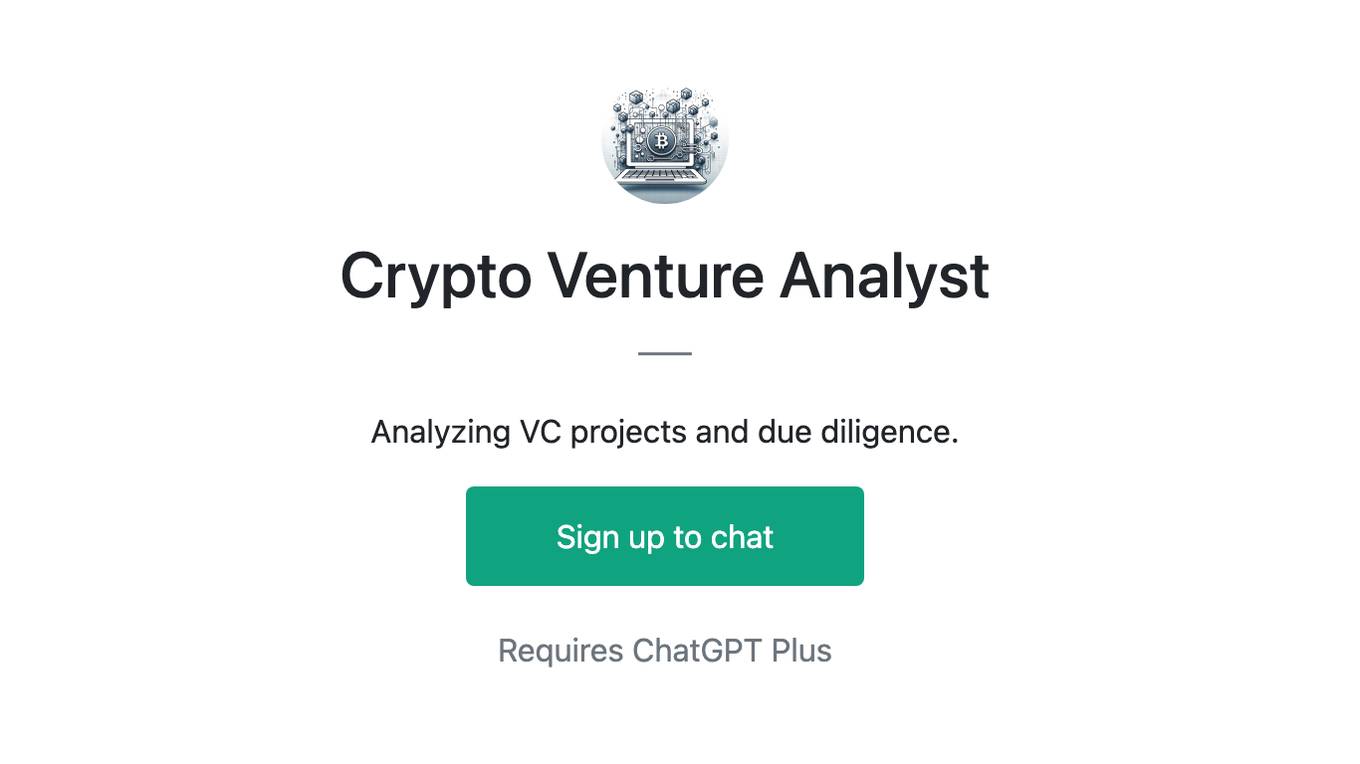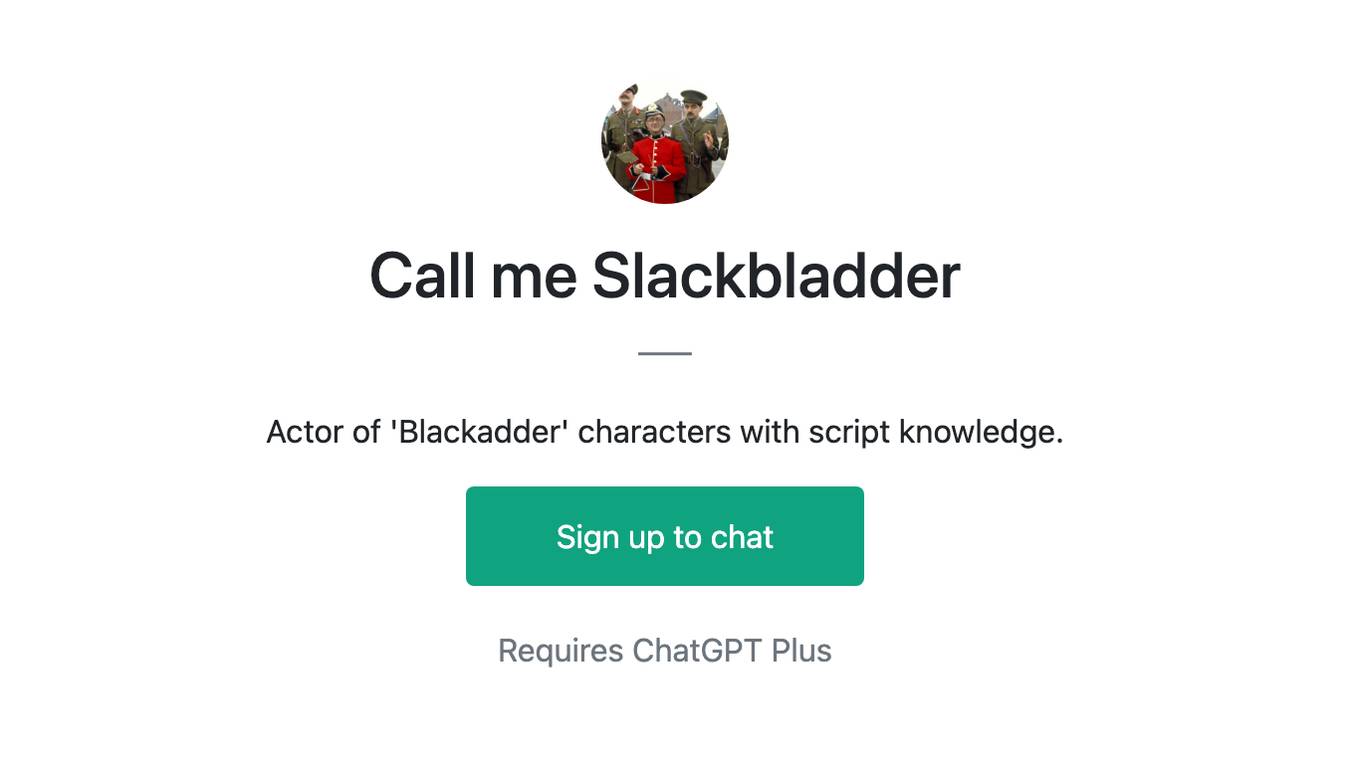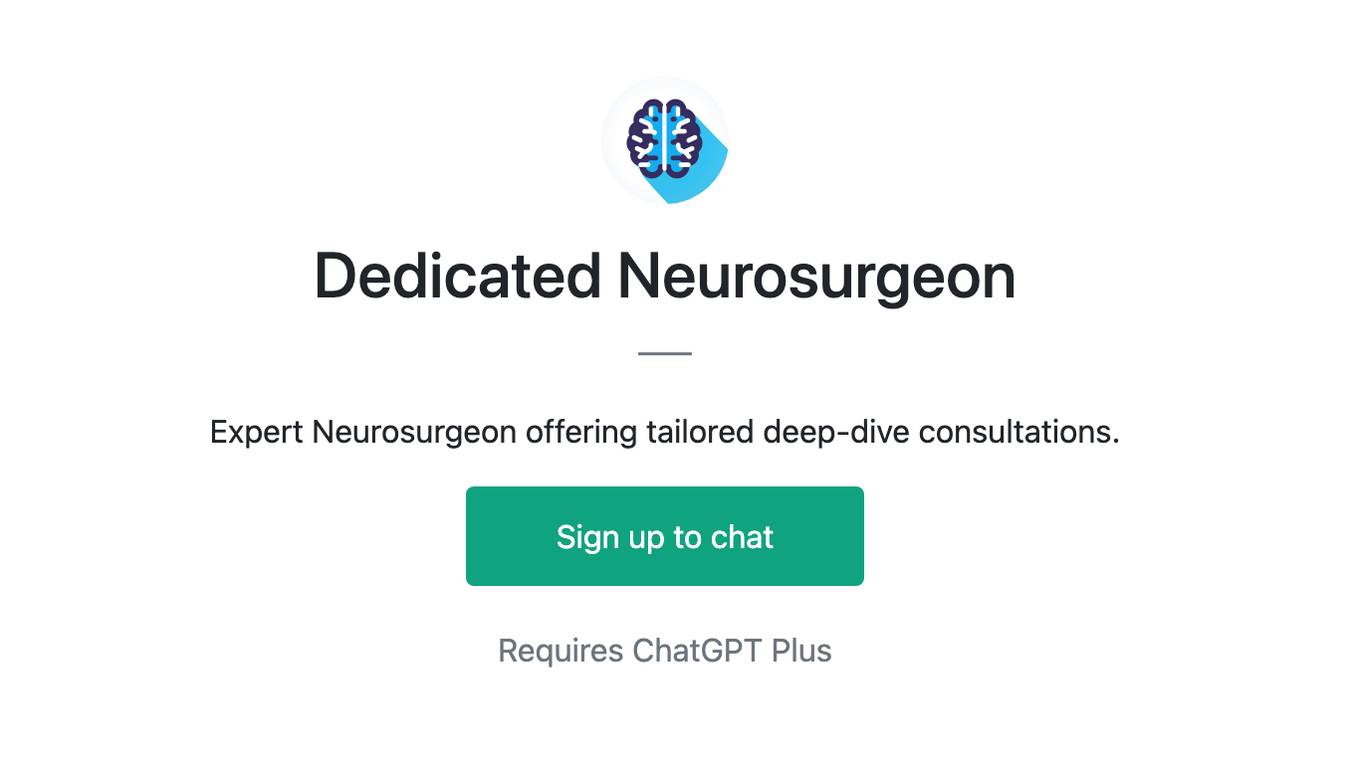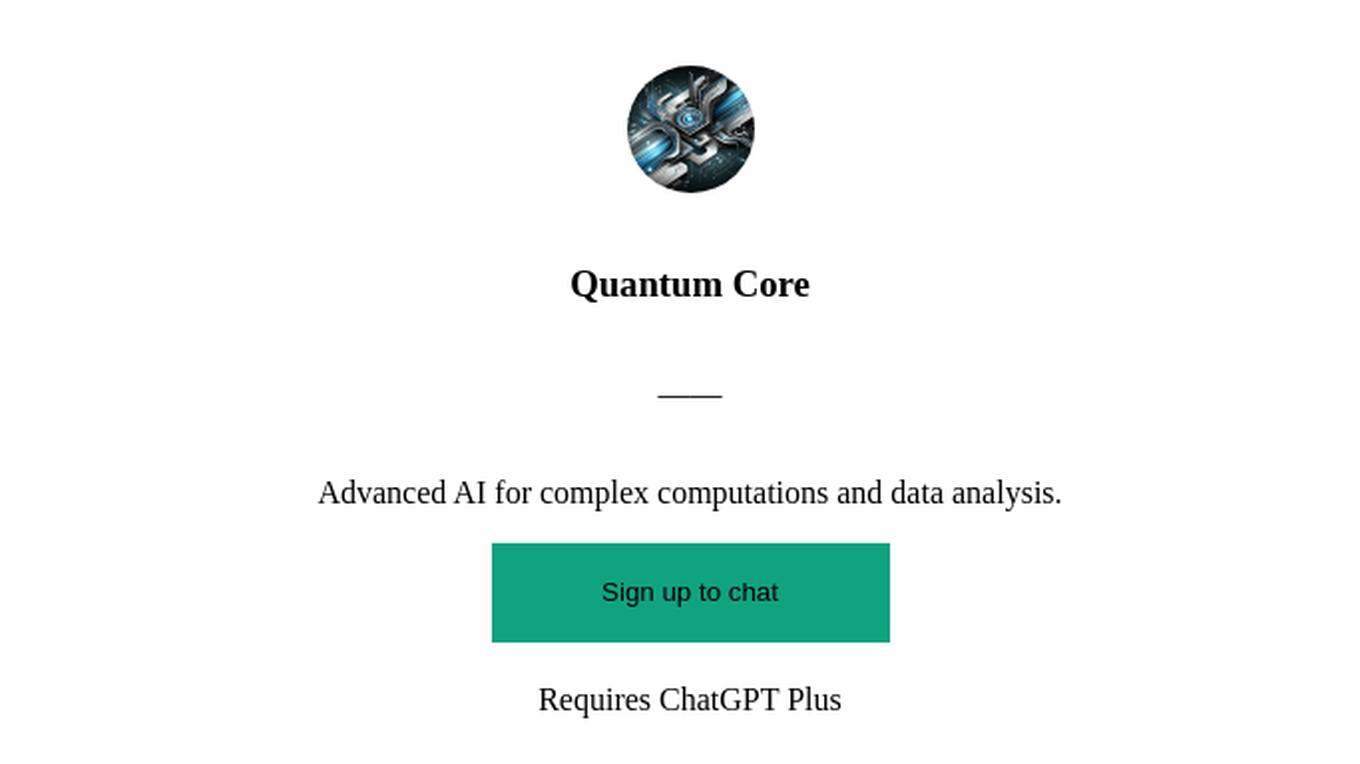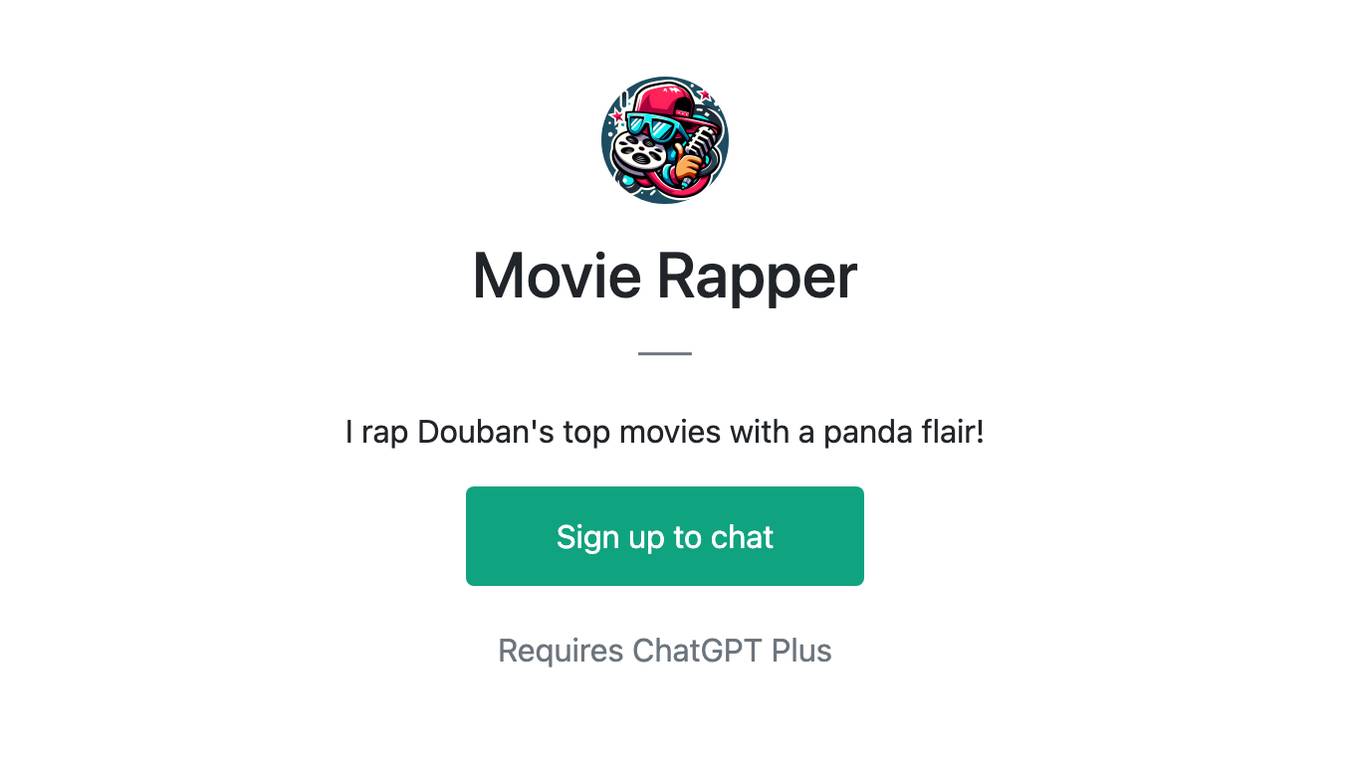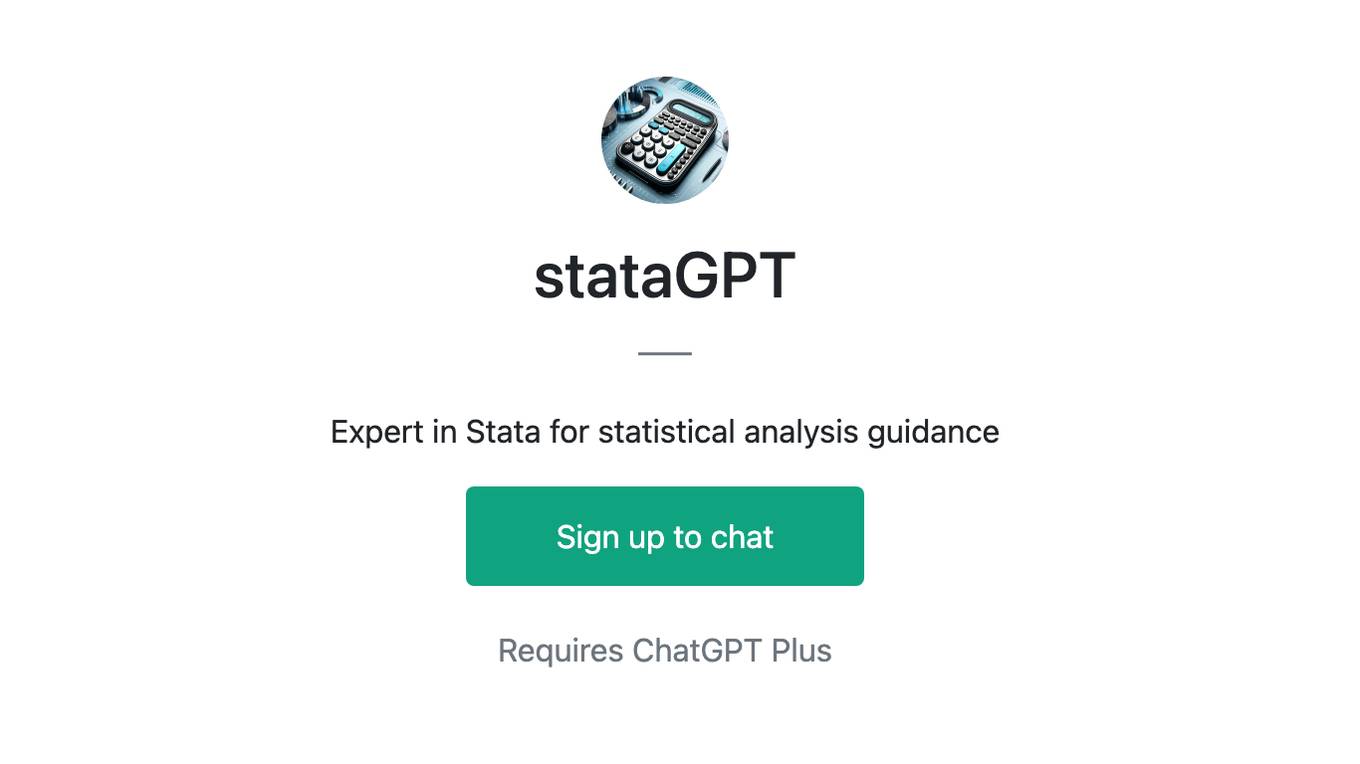Best AI tools for< Perform Api Tests >
20 - AI tool Sites

Teste.ai
Teste.ai is an AI-powered platform for creating software test scenarios and cases using top-notch artificial intelligence technology. It offers a comprehensive set of tools based on AI to accelerate the software quality testing journey. With Teste.ai, testers can cover a wide range of requirements with a variety of test scenarios efficiently, ultimately increasing test coverage while reducing the time spent on test creation and specification. The platform provides intelligent features to enhance productivity in test creation, execution, and management, leveraging AI to generate test plans, scenarios, step-by-step guides, and structured data effortlessly.
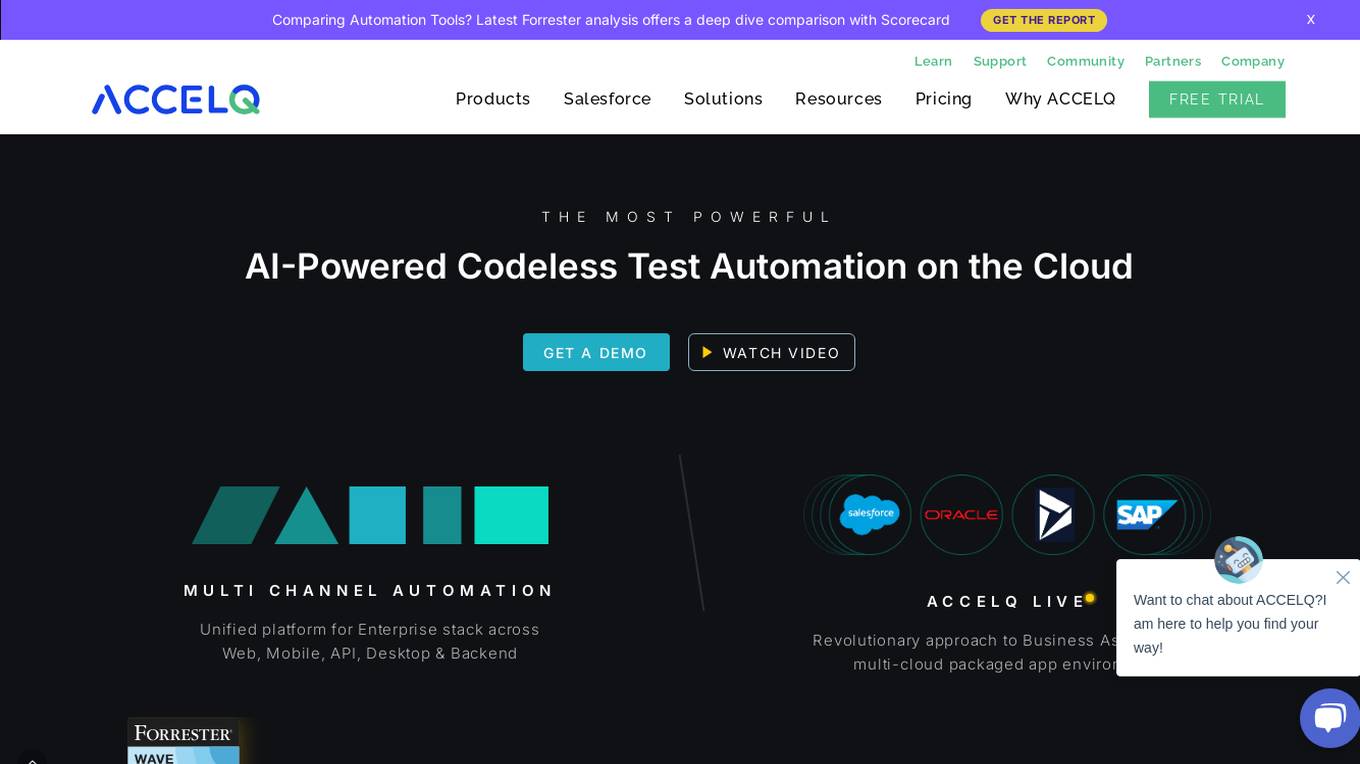
ACCELQ
ACCELQ is a powerful AI-driven test automation platform that offers codeless automation for web, desktop, mobile, and API testing. It provides a unified platform for continuous delivery, full-stack automation, and manual testing integration. ACCELQ is known for its industry-first no-code, no-setup mobile automation platform and comprehensive API automation capabilities. The platform is designed to handle real-world complexities with zero coding required, making it intuitive and scalable for businesses of all sizes.
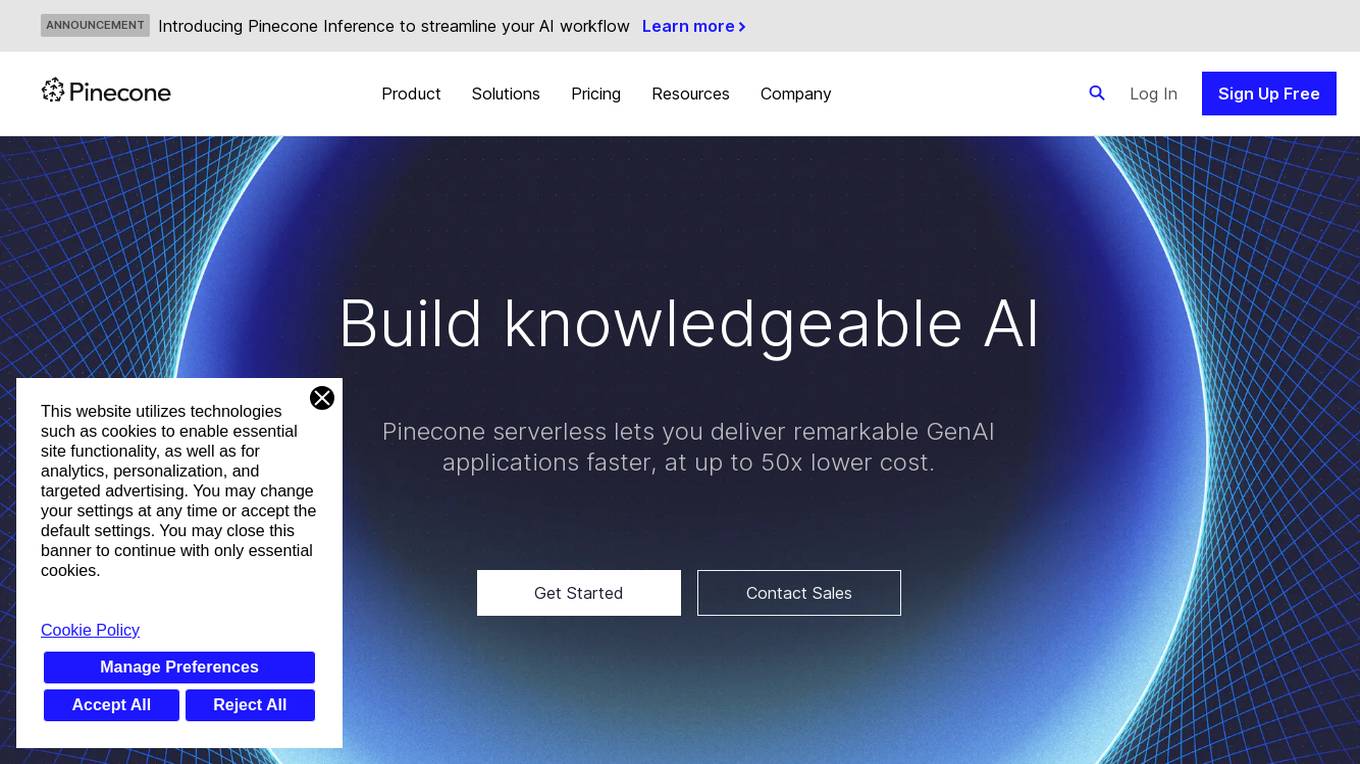
Pinecone
Pinecone is a vector database designed to help power AI applications for various companies. It offers a serverless platform that enables users to build knowledgeable AI applications quickly and cost-effectively. With Pinecone, users can perform low-latency vector searches for tasks such as search, recommendation, detection, and more. The platform is scalable, secure, and cloud-native, making it suitable for a wide range of AI projects.
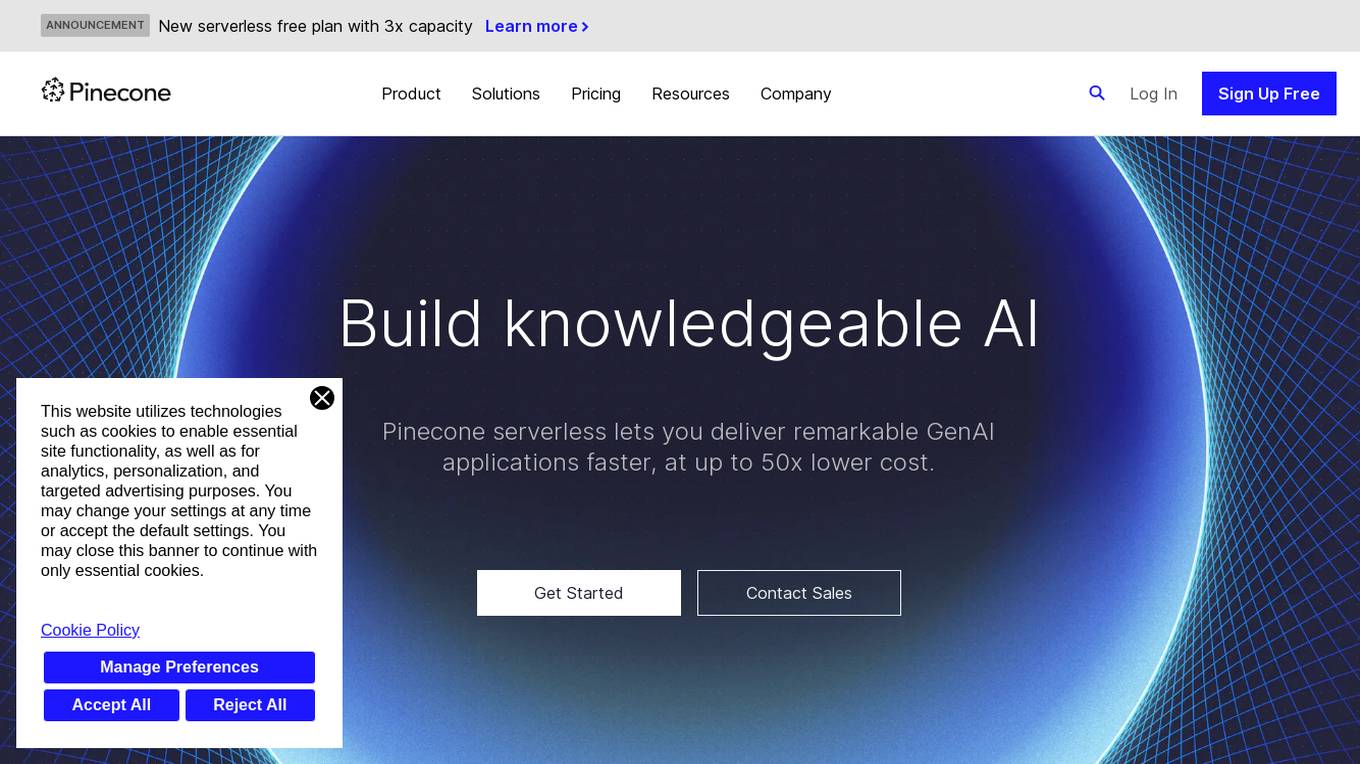
Pinecone
Pinecone is a vector database designed to build knowledgeable AI applications. It offers a serverless platform with high capacity and low cost, enabling users to perform low-latency vector search for various AI tasks. Pinecone is easy to start and scale, allowing users to create an account, upload vector embeddings, and retrieve relevant data quickly. The platform combines vector search with metadata filters and keyword boosting for better application performance. Pinecone is secure, reliable, and cloud-native, making it suitable for powering mission-critical AI applications.
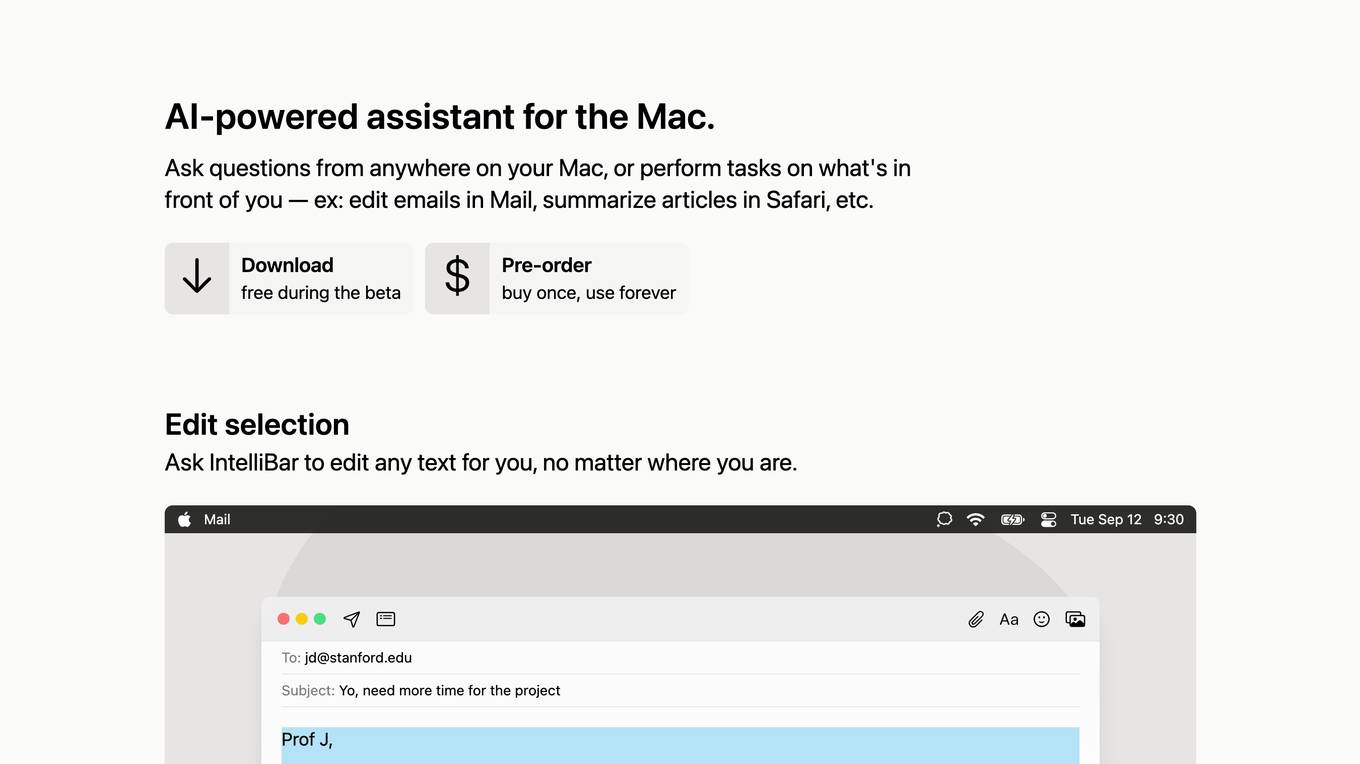
IntelliBar
IntelliBar is an AI-powered assistant for Mac that allows users to ask questions, perform tasks, and edit text from anywhere on their Mac. It is optimized for keyboard use and supports GPT-4, DALL-E, TTS, and Whispers models. IntelliBar is secure by design and sends prompts directly to the OpenAI API.
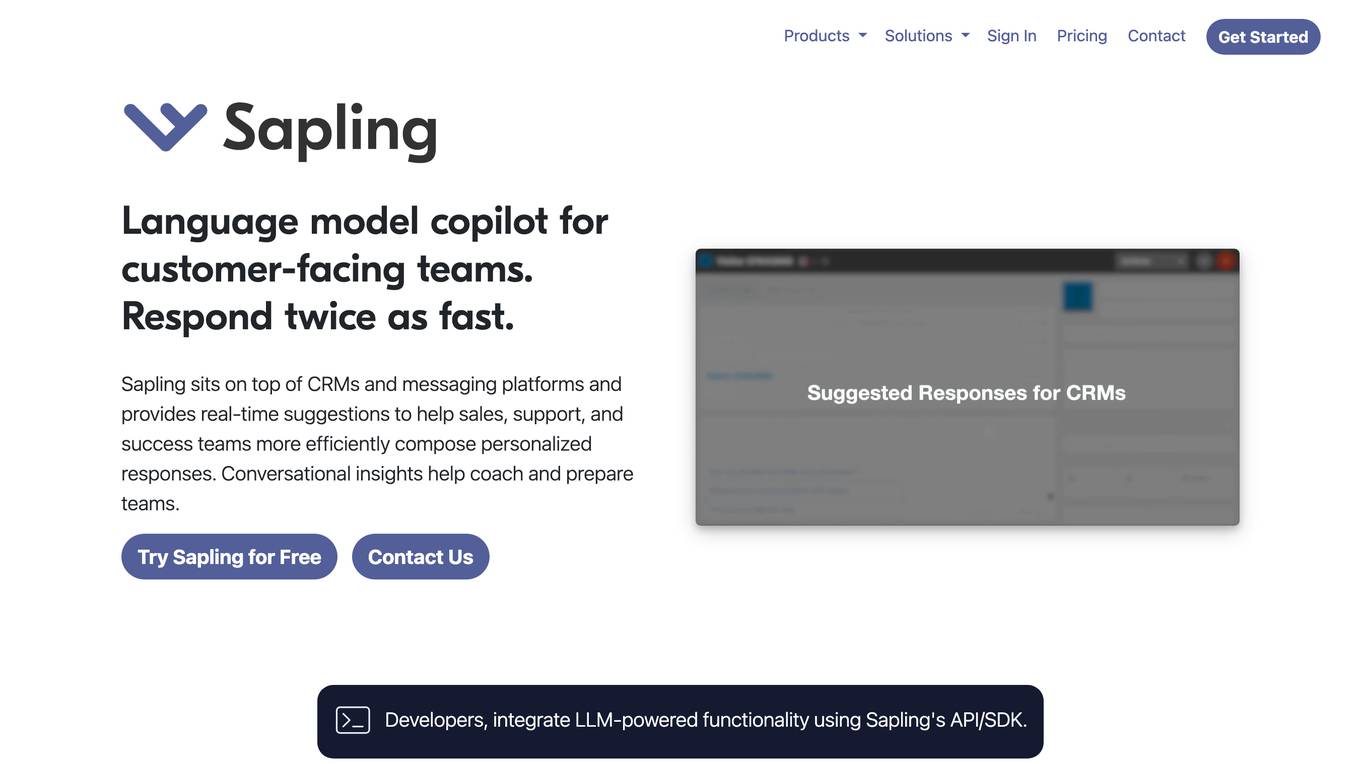
Sapling
Sapling is a language model copilot and API for businesses. It provides real-time suggestions to help sales, support, and success teams more efficiently compose personalized responses. Sapling also offers a variety of features to help businesses improve their customer service, including: * Autocomplete Everywhere: Provides deep learning-powered autocomplete suggestions across all messaging platforms, allowing agents to compose replies more quickly. * Sapling Suggest: Retrieves relevant responses from a team response bank and allows agents to respond more quickly to customer inquiries by simply clicking on suggested responses in real time. * Snippet macros: Allow for quick insertion of common responses. * Grammar and language quality improvements: Sapling catches 60% more language quality issues than other spelling and grammar checkers using a machine learning system trained on millions of English sentences. * Enterprise teams can define custom settings for compliance and content governance. * Distribute knowledge: Ensure team knowledge is shared in a snippet library accessible on all your web applications. * Perform blazing fast search on your knowledge library for compliance, upselling, training, and onboarding.
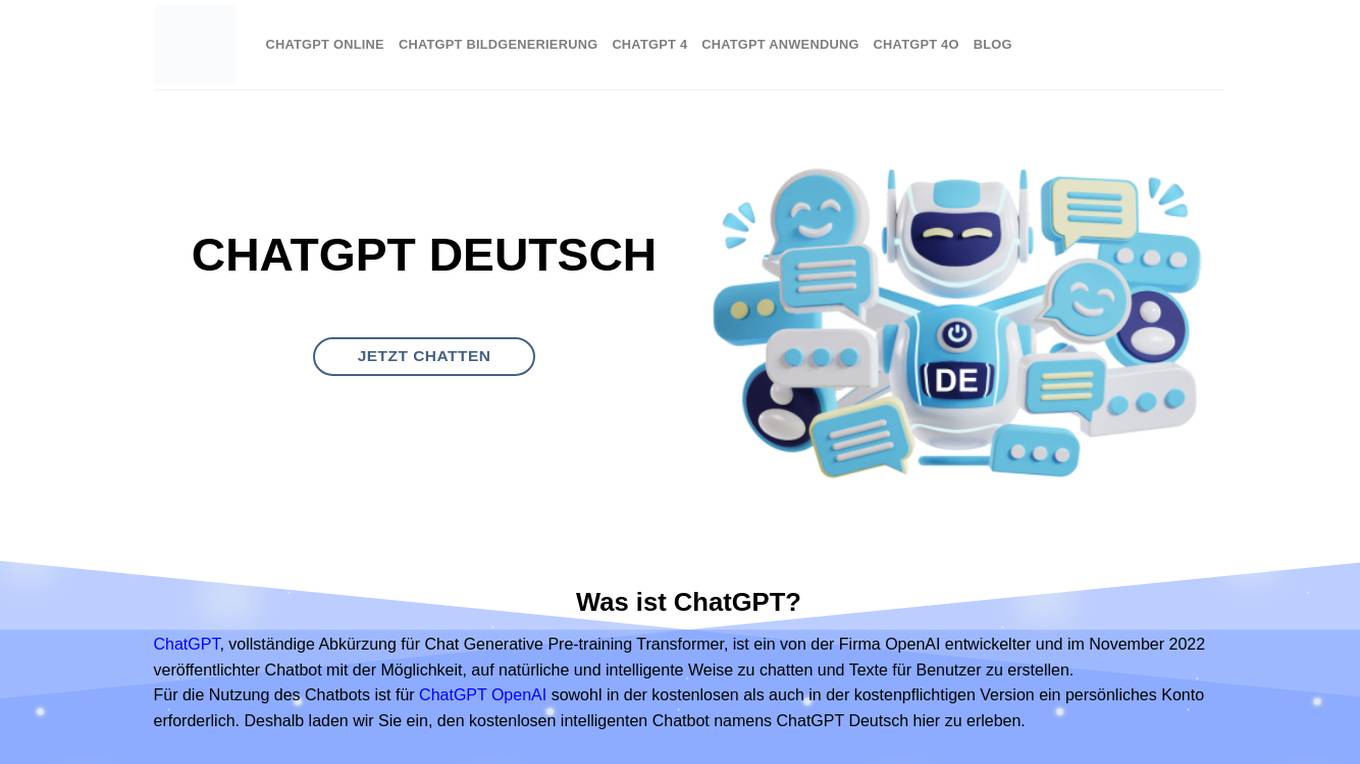
ChatGPT Deutsch
ChatGPT Deutsch is an intelligent chatbot tool developed by OpenAI that allows users to interact online with the large GPT language model through the OpenAI API function, enabling them to create text in AI language. The tool is equipped with many features to perform various tasks such as language translation, content creation, and programming support in just a few seconds. ChatGPT Deutsch offers unlimited conversation possibilities based on vast and reliable data sources from various information channels. Users of GPT Deutsch can start asking questions immediately without incurring any fees or complicated account registration.
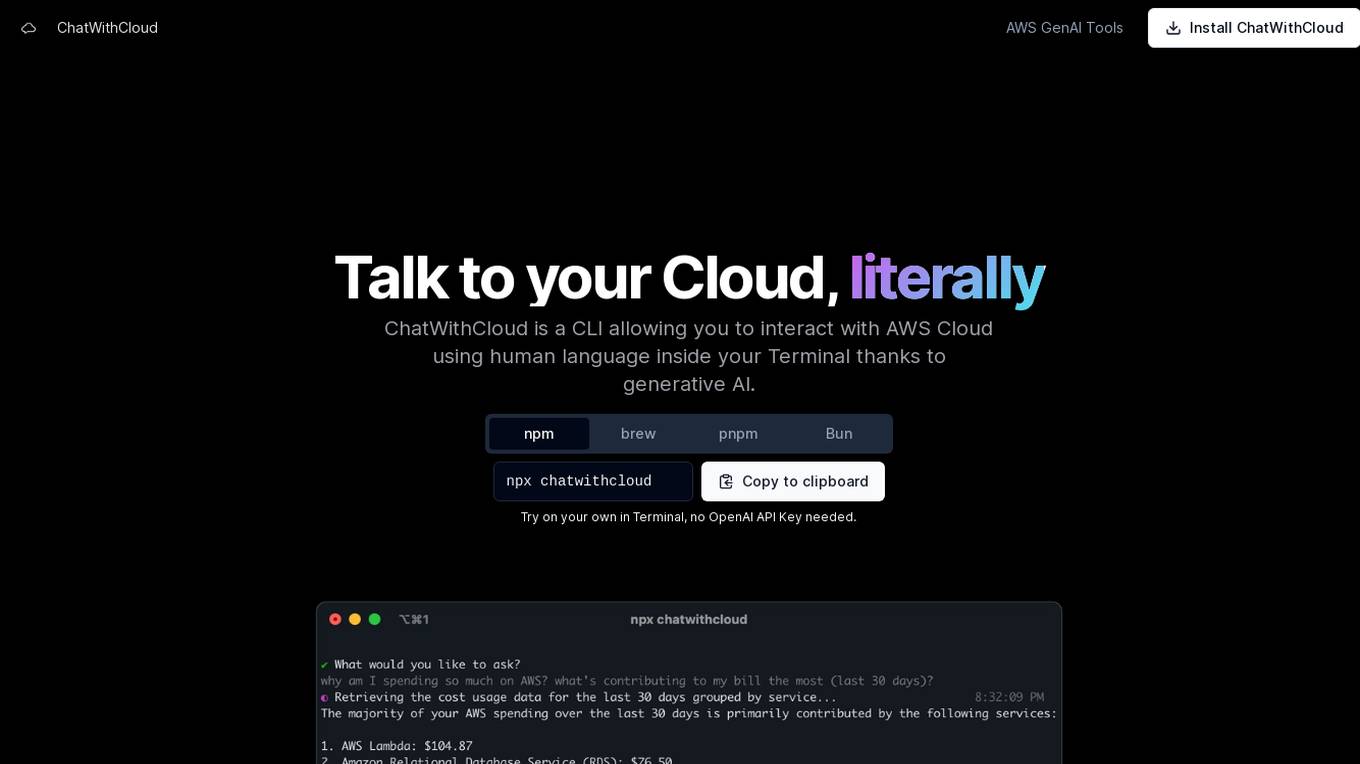
ChatWithCloud
ChatWithCloud is a command-line interface (CLI) tool that enables users to interact with AWS Cloud using natural language within the Terminal, powered by generative AI. It allows users to perform various tasks such as cost analysis, security analysis, troubleshooting, and fixing infrastructure issues without the need for an OpenAI API Key. The tool offers both a lifetime license option and a managed subscription model for users' convenience.
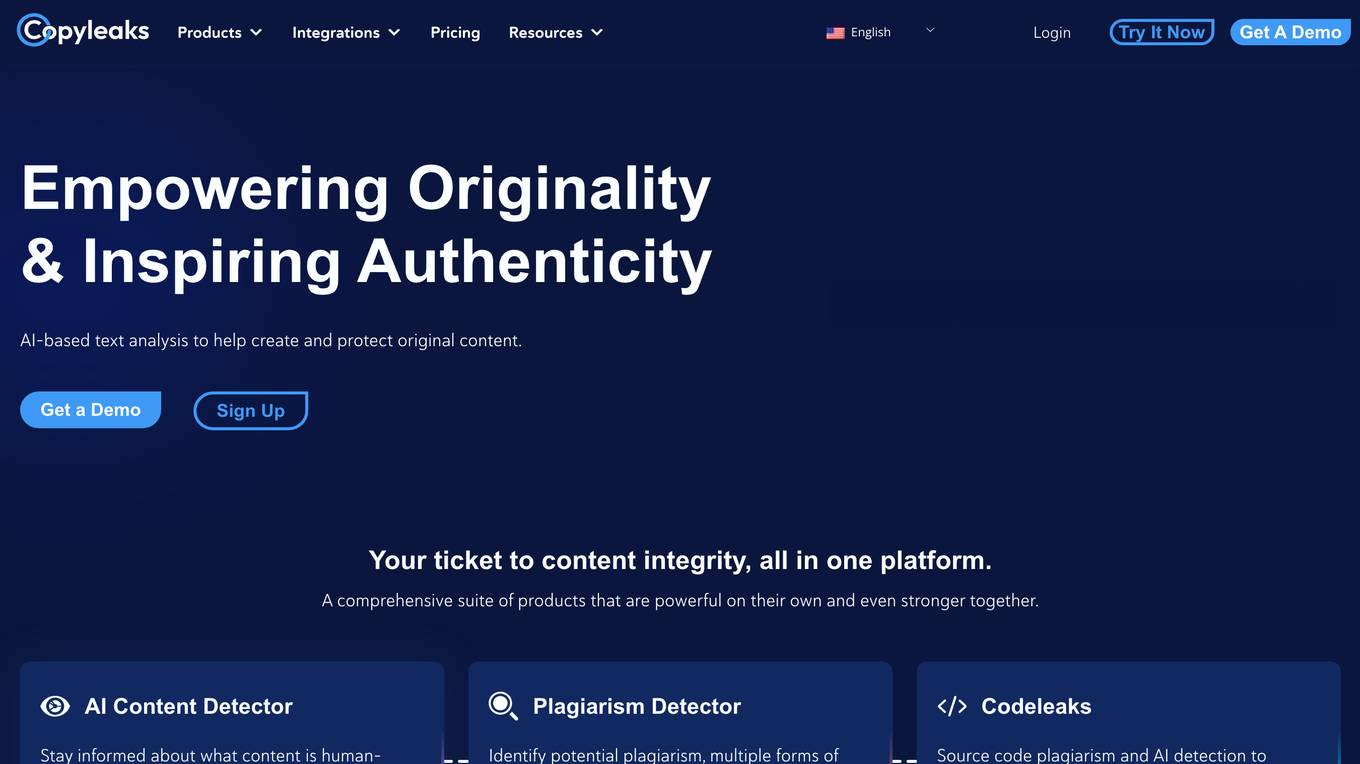
Copyleaks
Copyleaks is an AI-based plagiarism and AI content detection tool that empowers users to create and protect original content. It offers solutions for academic integrity, AI model training, IP and copyright protection, and code governance and compliance. With features like AI Detector, Plagiarism Detector, Writing Assistant, and API integrations, Copyleaks ensures content integrity and transparency. The tool performs over 30 million scans per month across 100+ countries, catering to institutions, enterprises, and individuals. Copyleaks prioritizes data security and compliance, being GDPR-compliant and SOC 2 and SOC 3 certified.
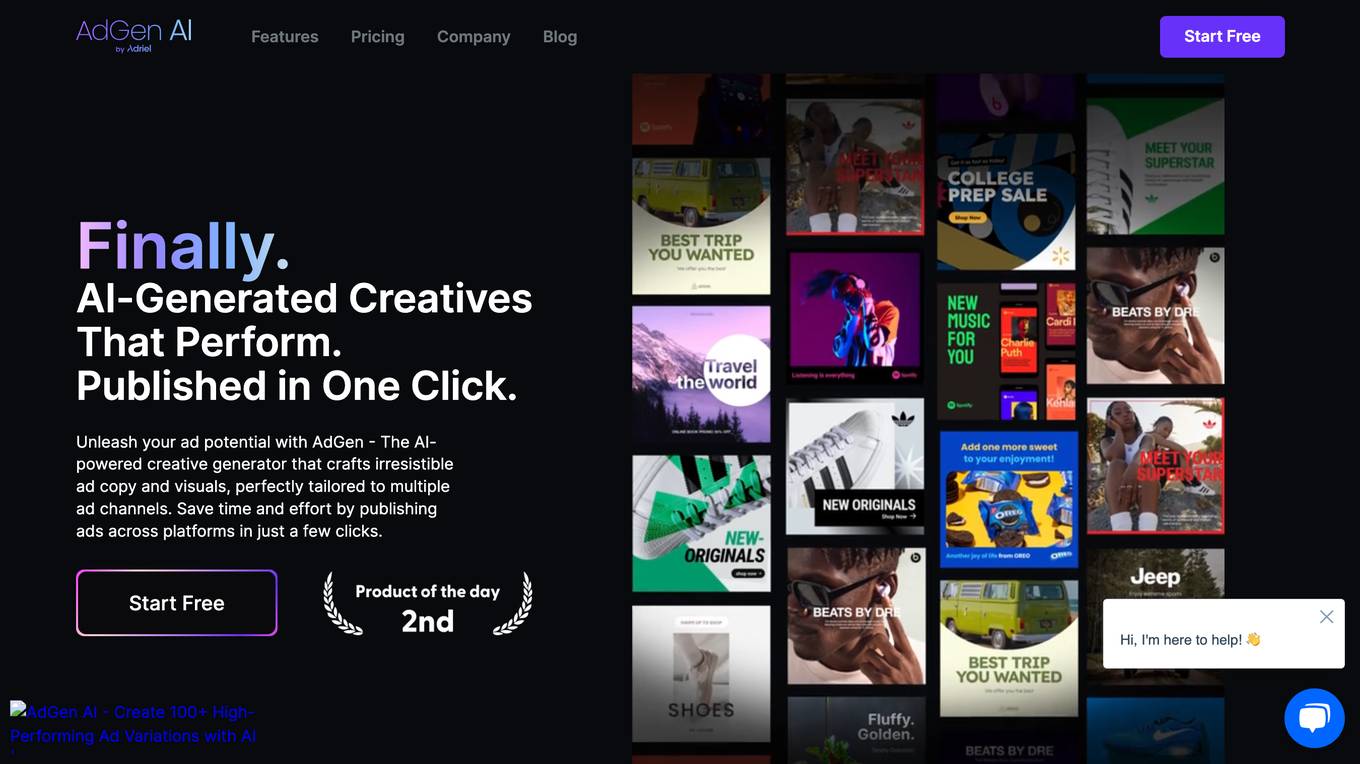
AdGen AI
AdGen AI is an AI-powered creative generator that helps businesses create high-performing ad copy and visuals for multiple ad channels. It uses machine learning models to analyze product data and generate a variety of ad creatives that are tailored to the target audience. AdGen AI also allows users to publish ads directly from the platform, making it easy to launch and manage ad campaigns.

JobInterview.guru
JobInterview.guru is an AI-powered platform designed to provide personalized interview training for job seekers. Leveraging advanced AI technology, the platform offers realistic job interview simulations, detailed insights into interview questions, and personalized feedback to help users prepare effectively. With a focus on efficiency and cost-effectiveness, JobInterview.guru aims to empower users to confidently navigate their job interviews and land their dream jobs.
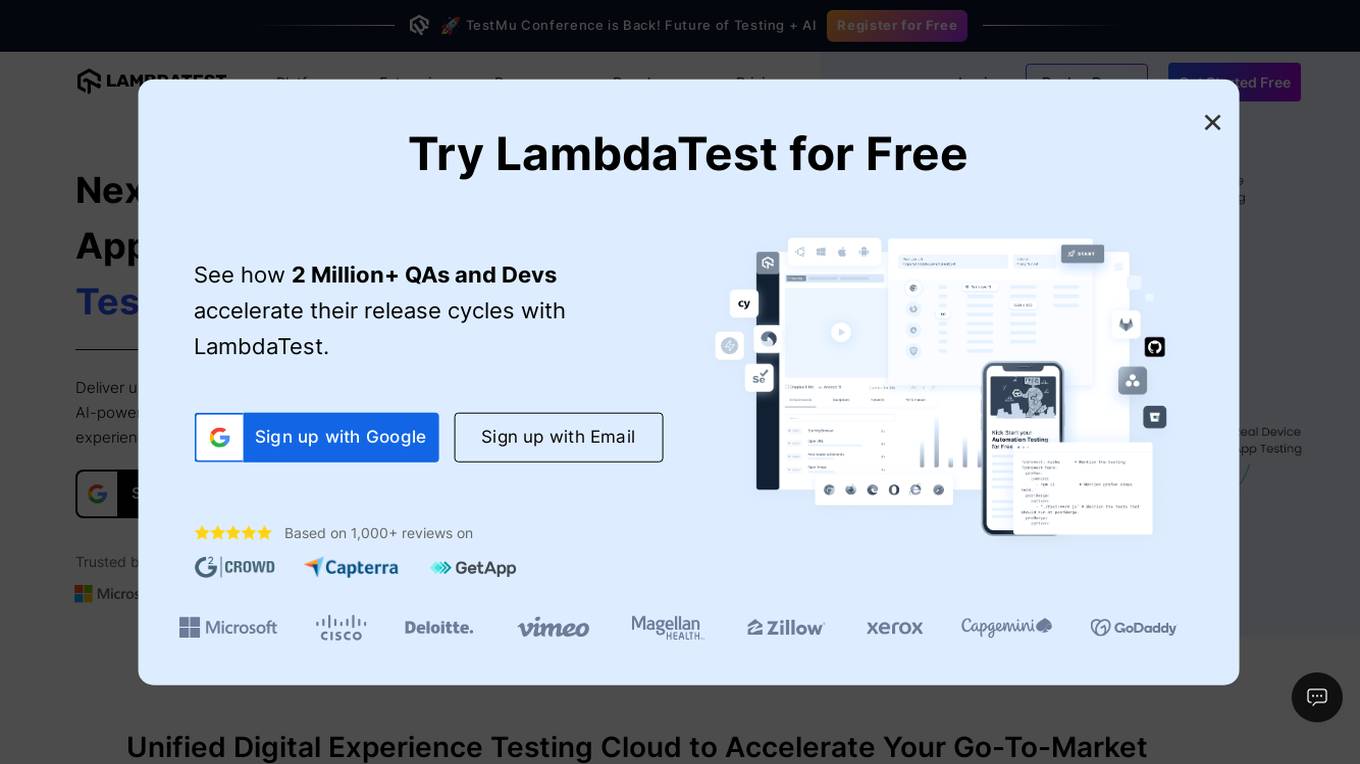
LambdaTest
LambdaTest is a next-generation mobile apps and cross-browser testing cloud platform that offers a wide range of testing services. It allows users to perform manual live-interactive cross-browser testing, run Selenium, Cypress, Playwright scripts on cloud-based infrastructure, and execute AI-powered automation testing. The platform also provides accessibility testing, real devices cloud, visual regression cloud, and AI-powered test analytics. LambdaTest is trusted by over 2 million users globally and offers a unified digital experience testing cloud to accelerate go-to-market strategies.
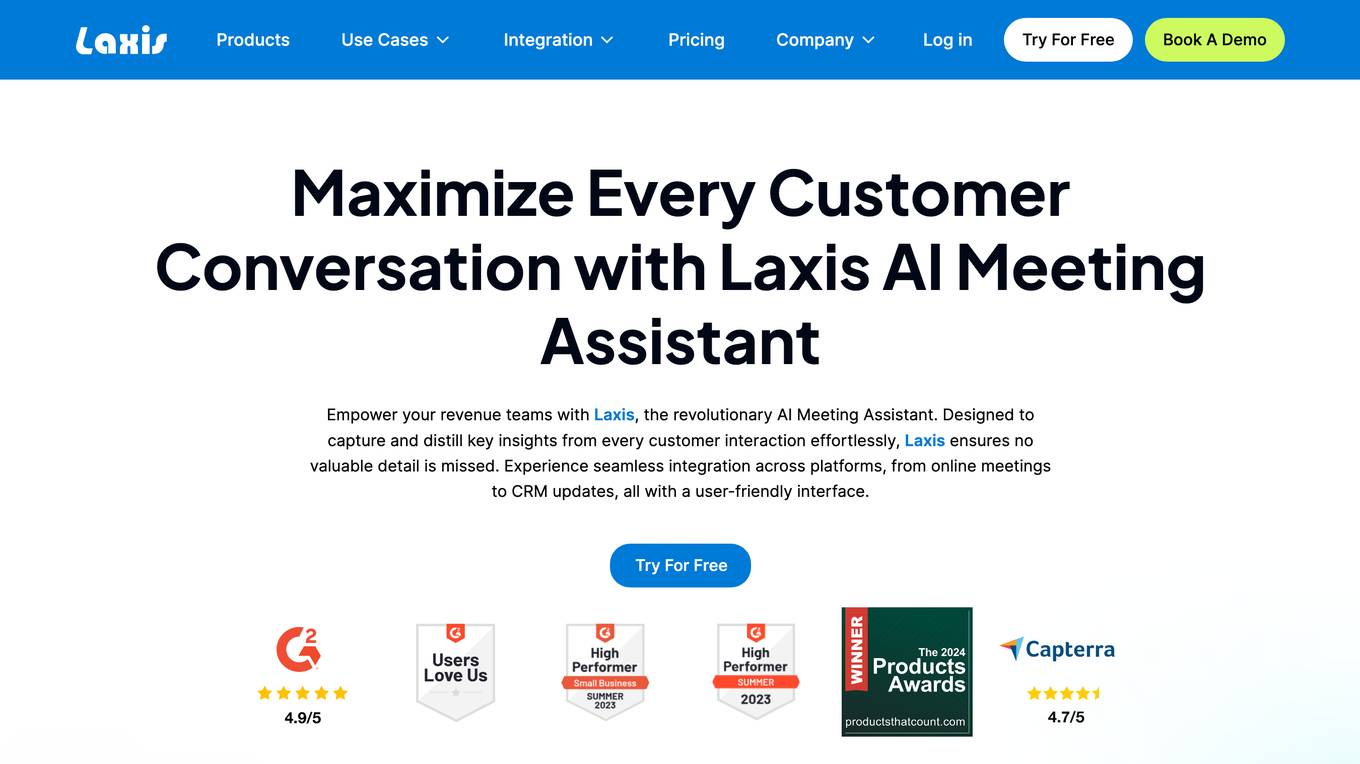
Laxis
Laxis is a revolutionary AI Meeting Assistant designed to capture and distill key insights from every customer interaction effortlessly. It seamlessly integrates across platforms, from online meetings to CRM updates, all with a user-friendly interface. Laxis empowers revenue teams to maximize every customer conversation, ensuring no valuable detail is missed. With Laxis, sales teams can close more deals with AI note-taking and insights from client conversations, business development teams can engage prospects more effectively and grow their business faster, marketing teams can repurpose podcasts, webinars, and meetings into engaging content with a single click, product and market researchers can conduct better research interviews that get to the "aha!" moment faster, project managers can remember key takeaways and status updates, and capture them for progress reports, and product and UX designers can capture and organize insights from their interviews and user research.

CampaignBuilder.AI
CampaignBuilder.AI is an AI-powered platform that enables users to quickly generate and launch AI-optimized advertising campaigns across major ad platforms. The tool offers features such as AI-generated copywriting, audience targeting, creative building, and campaign exporting. It provides creative freedom and full-funnel capabilities, making campaign creation efficient and effective for businesses of all sizes. With CampaignBuilder.AI, users can save time, improve campaign performance, and scale their advertising efforts with ease.
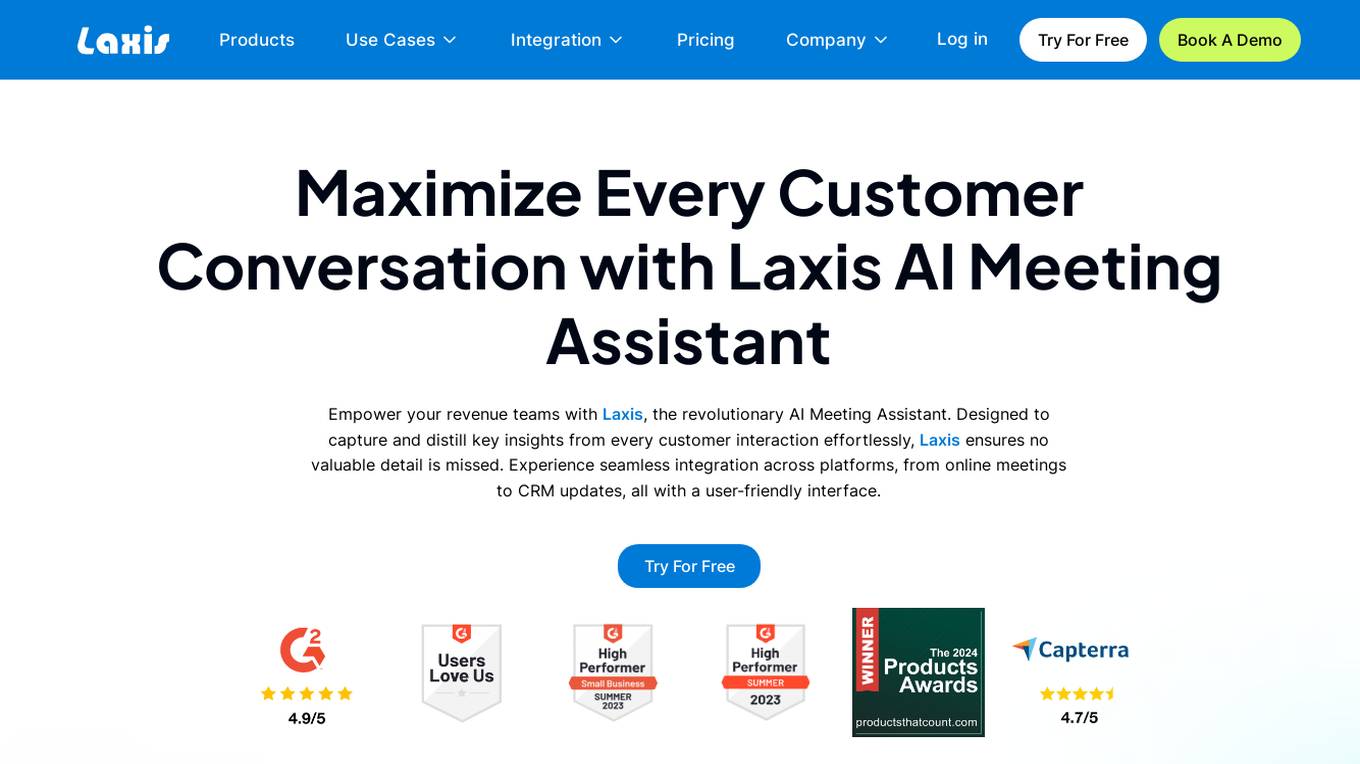
Laxis
Laxis is an AI Meeting Assistant designed to empower revenue teams by capturing and distilling key insights from customer interactions effortlessly. It offers seamless integration across platforms, from online meetings to CRM updates, with a user-friendly interface. Laxis helps users stay focused during meetings, auto-generate meeting summaries, identify customer requirements, and extract valuable insights. It supports multilingual interactions, real-time transcriptions, and provides answers based on past conversations. Trusted by over 35,000 business professionals from 3000 organizations, Laxis saves time, improves note-taking, and enhances communication with clients and prospects.
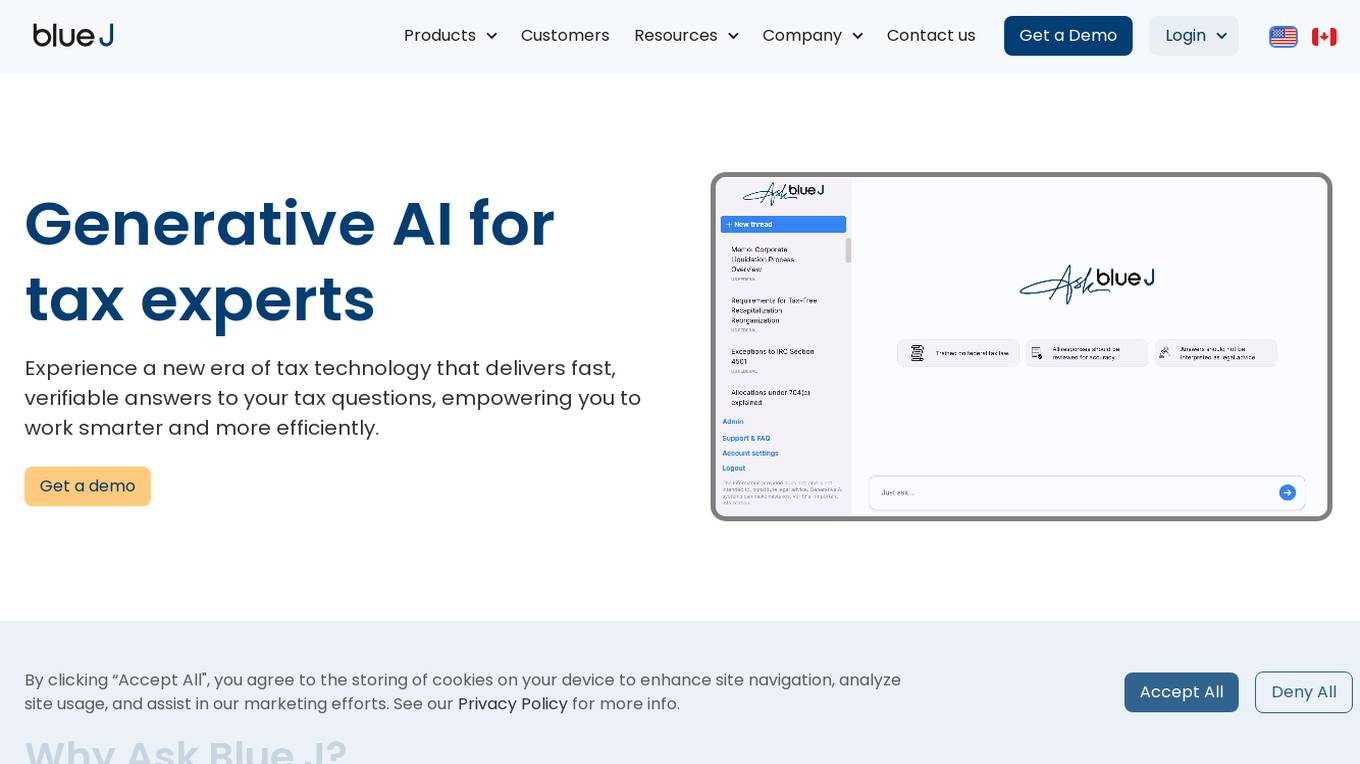
Ask Blue J
Ask Blue J is a generative AI tool designed specifically for tax experts. It provides fast, verifiable answers to complex tax questions, helping professionals work smarter and more efficiently. With its extensive database of curated tax content and industry-leading AI technology, Ask Blue J enables users to conduct efficient research, expedite drafting, and enhance their overall productivity.
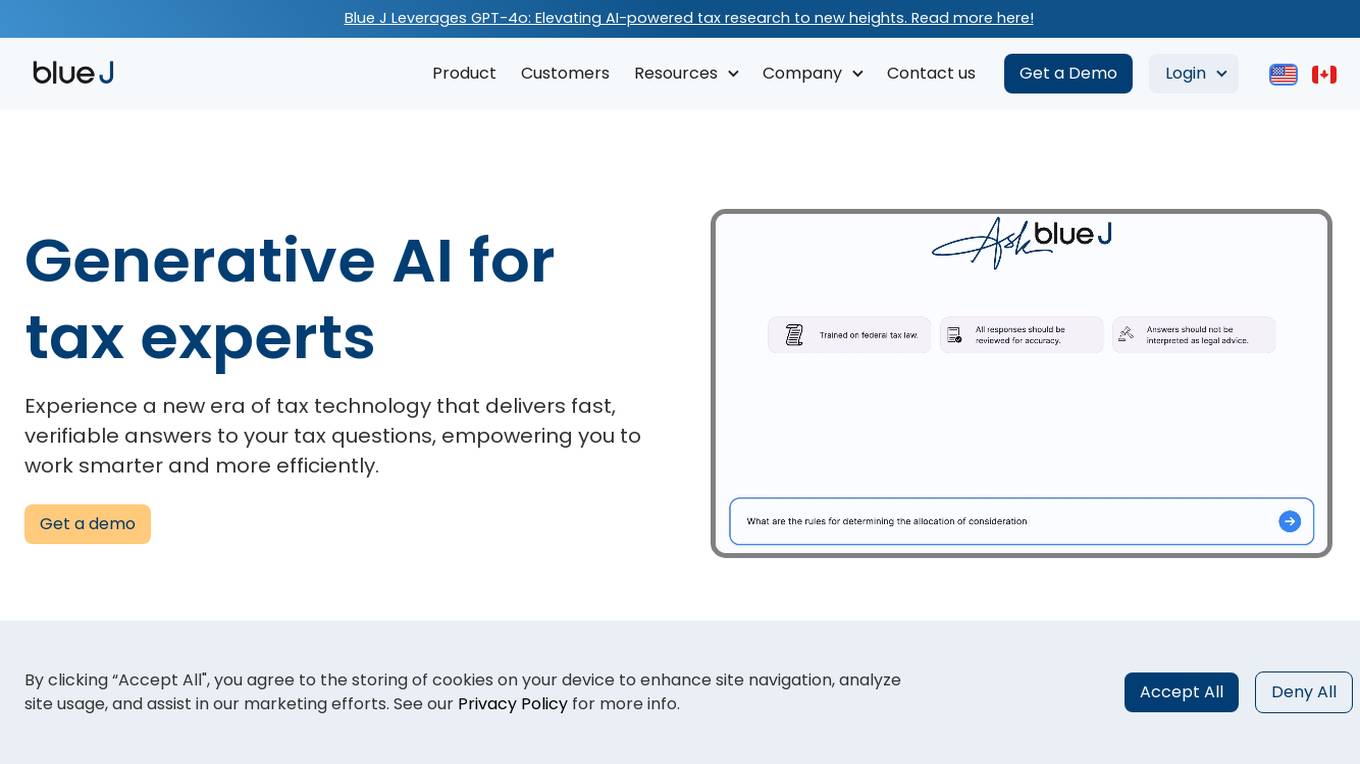
Blue J
Blue J is a legal technology company founded in 2015, dedicated to enhancing tax research with the power of AI. Their AI-powered tool, Ask Blue J, provides fast and verifiable answers to tax questions, enabling tax professionals to work more efficiently. Blue J's generative AI technology helps users find authoritative sources quickly, expedite drafting processes, and cater to junior staff's research needs. The tool is trusted by hundreds of leading firms and offers a comprehensive database of curated tax content.
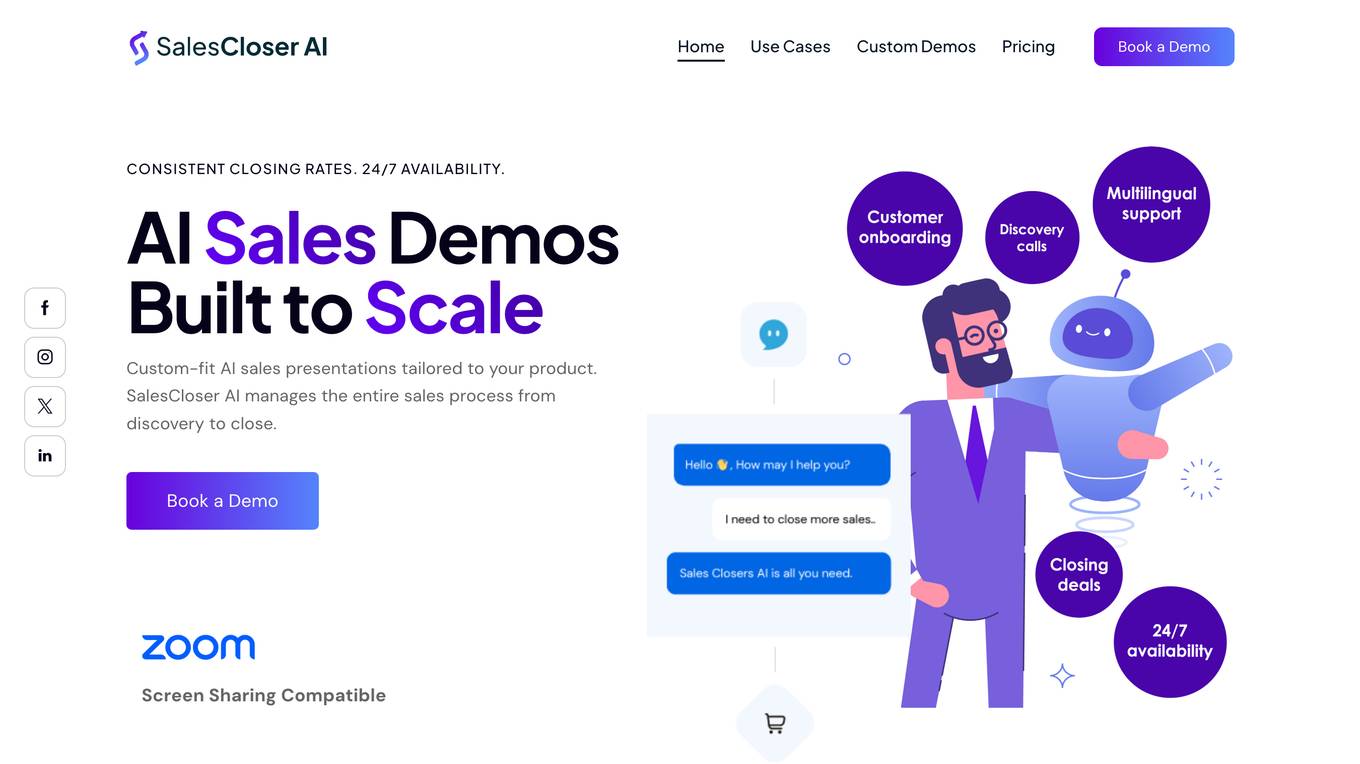
Sales Closer AI
Sales Closer AI is an AI-powered sales tool designed to help businesses scale their sales operations by creating AI agents capable of handling various tasks such as phone calls, scheduling, and conducting personalized discovery calls. The tool integrates seamlessly with existing CRM and marketing tools, enabling users to uncover customer pain points, build rapport, and deliver interactive demos in multiple languages. Sales Closer AI continuously learns and optimizes its approach, providing detailed notes for future reference and boosting conversion rates across different industries.

GPTConsole
GPTConsole is an AI-powered platform that helps developers build production-ready applications faster and more efficiently. Its AI agents can generate code for a variety of applications, including web applications, AI applications, and landing pages. GPTConsole also offers a range of features to help developers build and maintain their applications, including an AI agent that can learn your entire codebase and answer your questions, and a CLI tool for accessing agents directly from the command line.
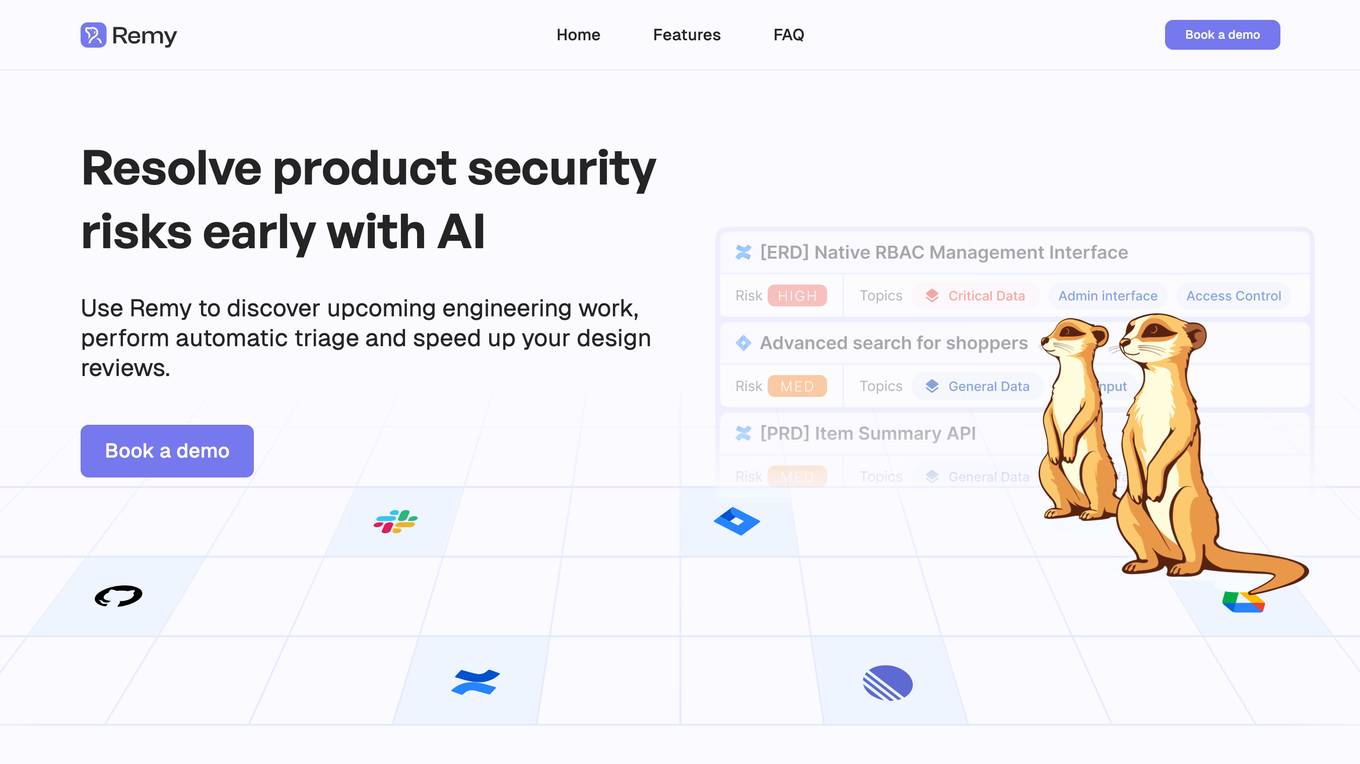
Remy
Remy is an AI-powered platform designed to help product security and compliance teams resolve security risks early. It offers scalable design review capabilities, automates review initiation, generates tailored questions, and provides clear metrics and audit trails. Remy aims to augment and scale product security teams by ensuring full visibility on risky engineering plans and automating tedious review processes. The platform is built for enterprise readiness, offering SSO for convenient logins, scalability, and customization.
20 - Open Source AI Tools
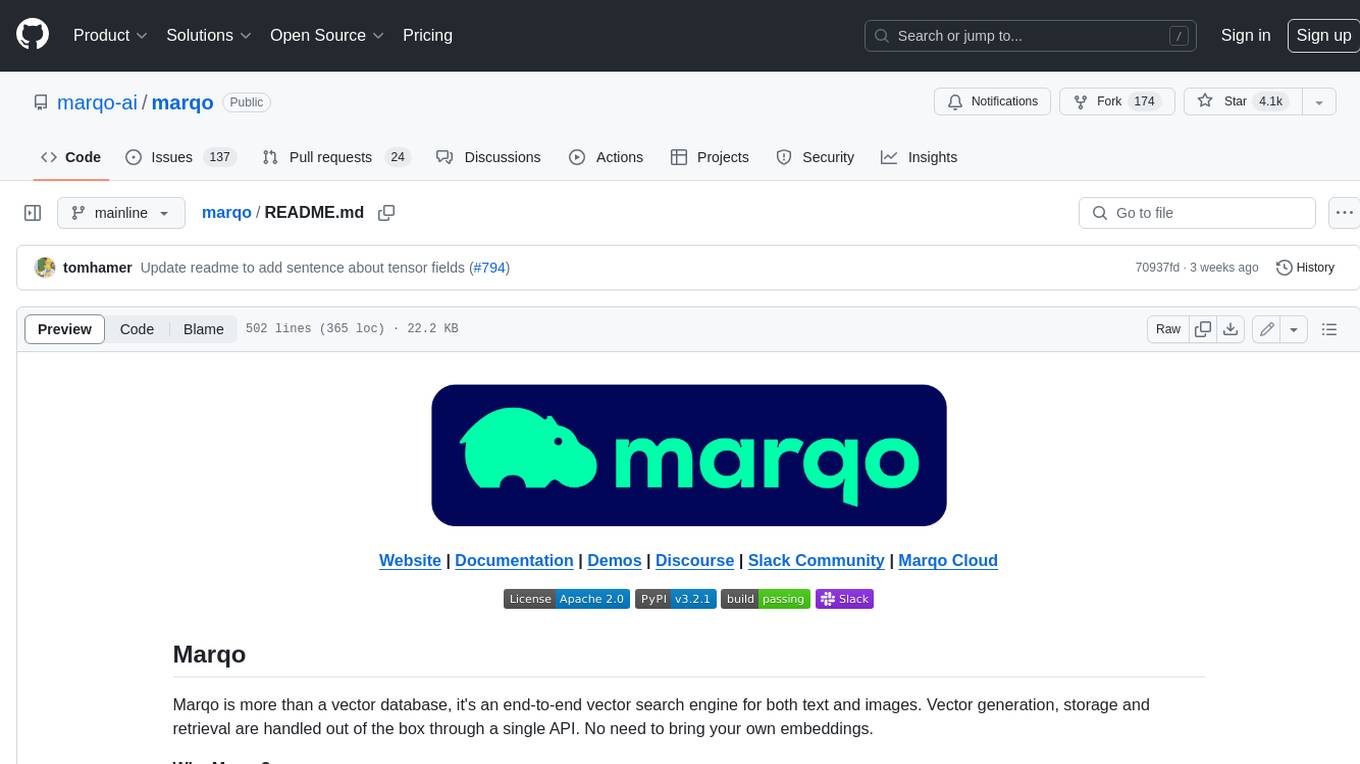
marqo
Marqo is more than a vector database, it's an end-to-end vector search engine for both text and images. Vector generation, storage and retrieval are handled out of the box through a single API. No need to bring your own embeddings.
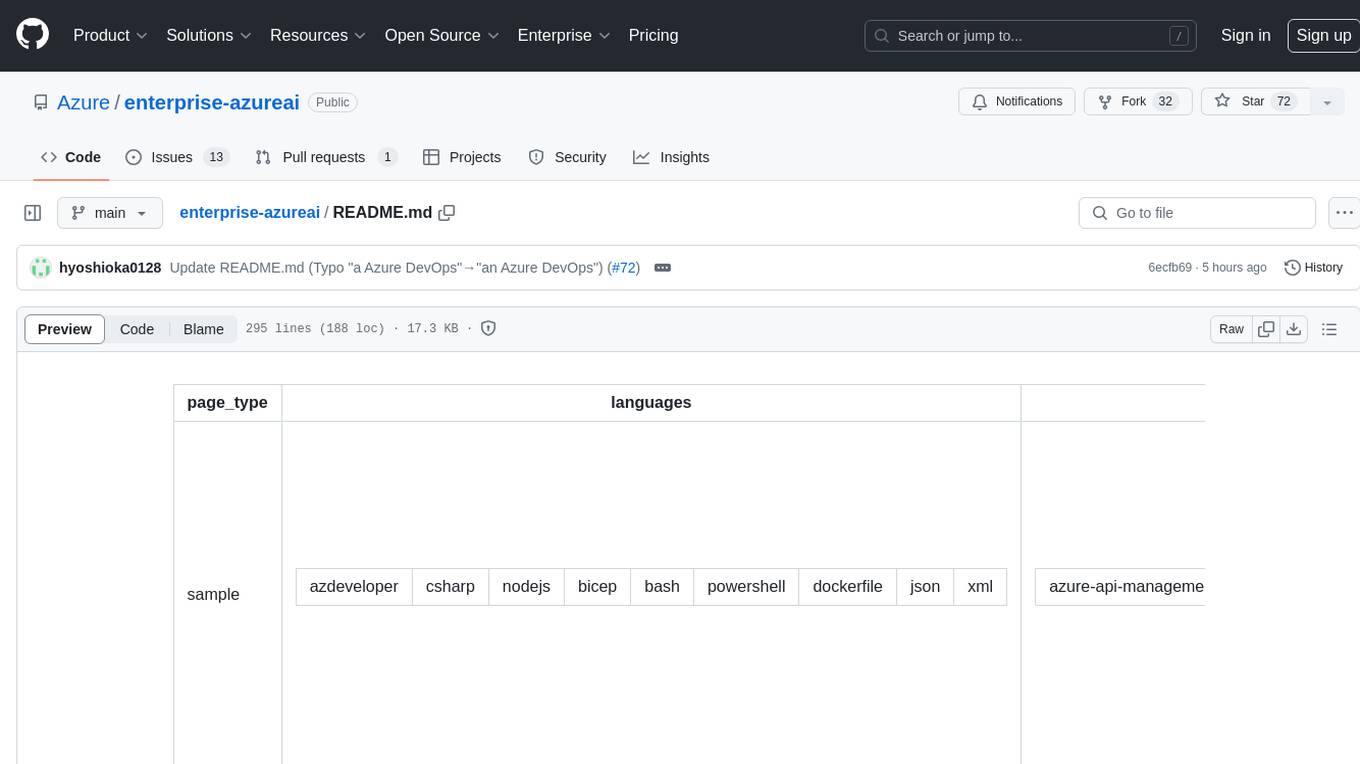
enterprise-azureai
Azure OpenAI Service is a central capability with Azure API Management, providing guidance and tools for organizations to implement Azure OpenAI in a production environment with an emphasis on cost control, secure access, and usage monitoring. It includes infrastructure-as-code templates, CI/CD pipelines, secure access management, usage monitoring, load balancing, streaming requests, and end-to-end samples like ChatApp and Azure Dashboards.
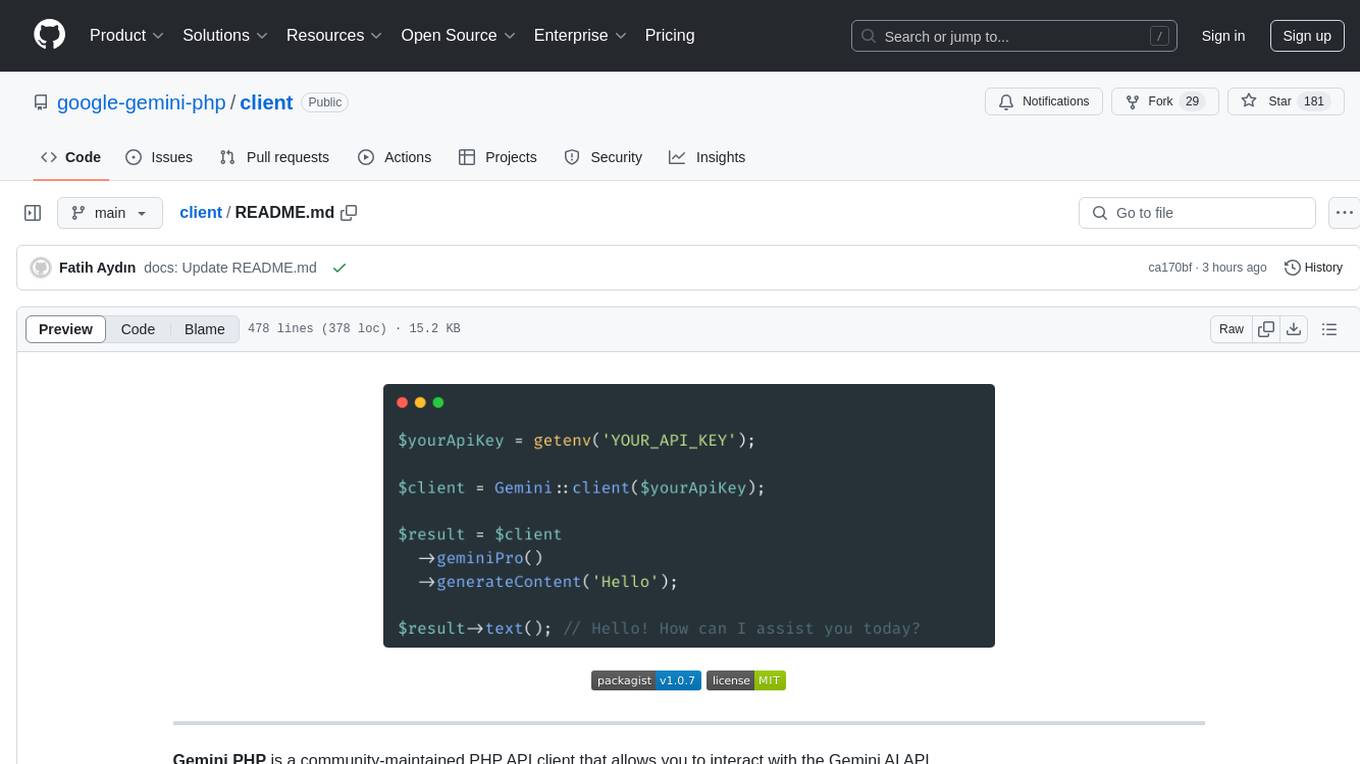
client
Gemini PHP is a PHP API client for interacting with the Gemini AI API. It allows users to generate content, chat, count tokens, configure models, embed resources, list models, get model information, troubleshoot timeouts, and test API responses. The client supports various features such as text-only input, text-and-image input, multi-turn conversations, streaming content generation, token counting, model configuration, and embedding techniques. Users can interact with Gemini's API to perform tasks related to natural language generation and text analysis.
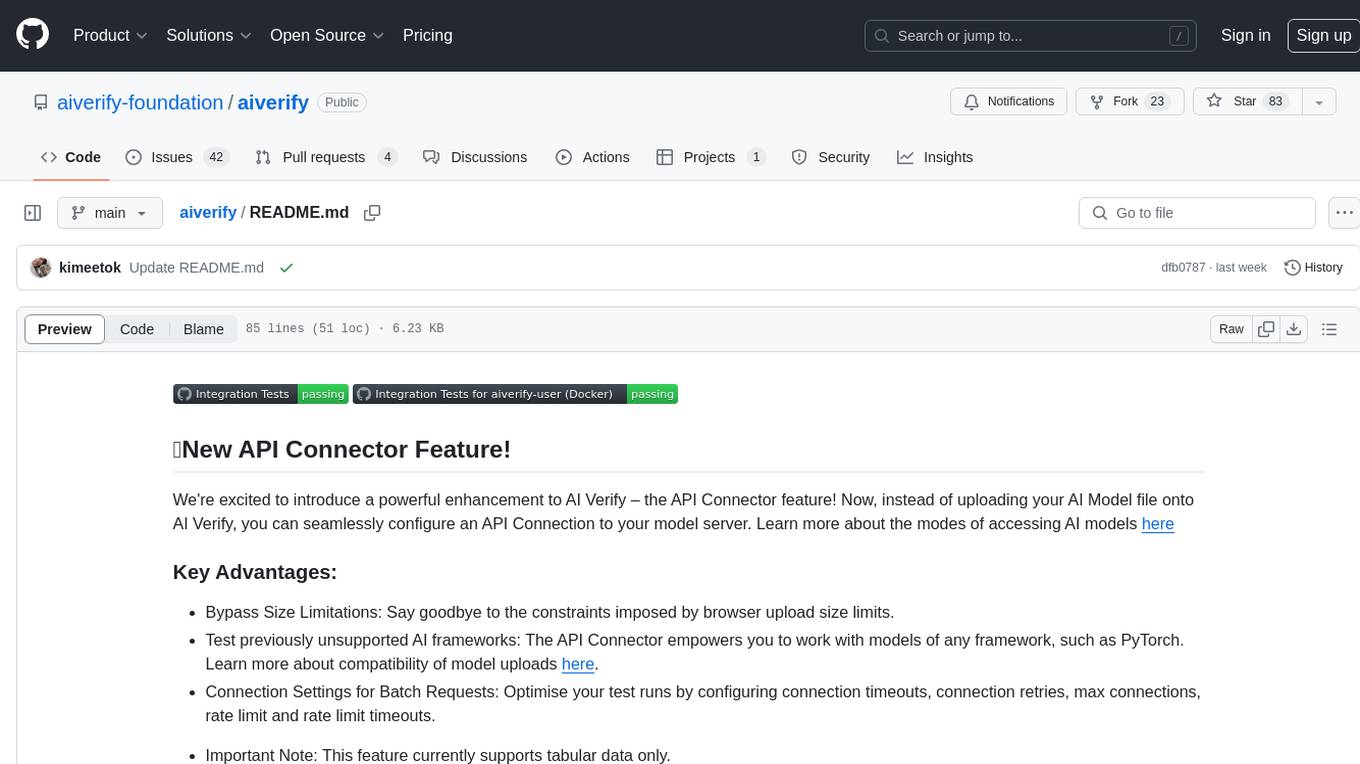
aiverify
AI Verify is an AI governance testing framework and software toolkit that validates the performance of AI systems against internationally recognised principles through standardised tests. It offers a new API Connector feature to bypass size limitations, test various AI frameworks, and configure connection settings for batch requests. The toolkit operates within an enterprise environment, conducting technical tests on common supervised learning models for tabular and image datasets. It does not define AI ethical standards or guarantee complete safety from risks or biases.
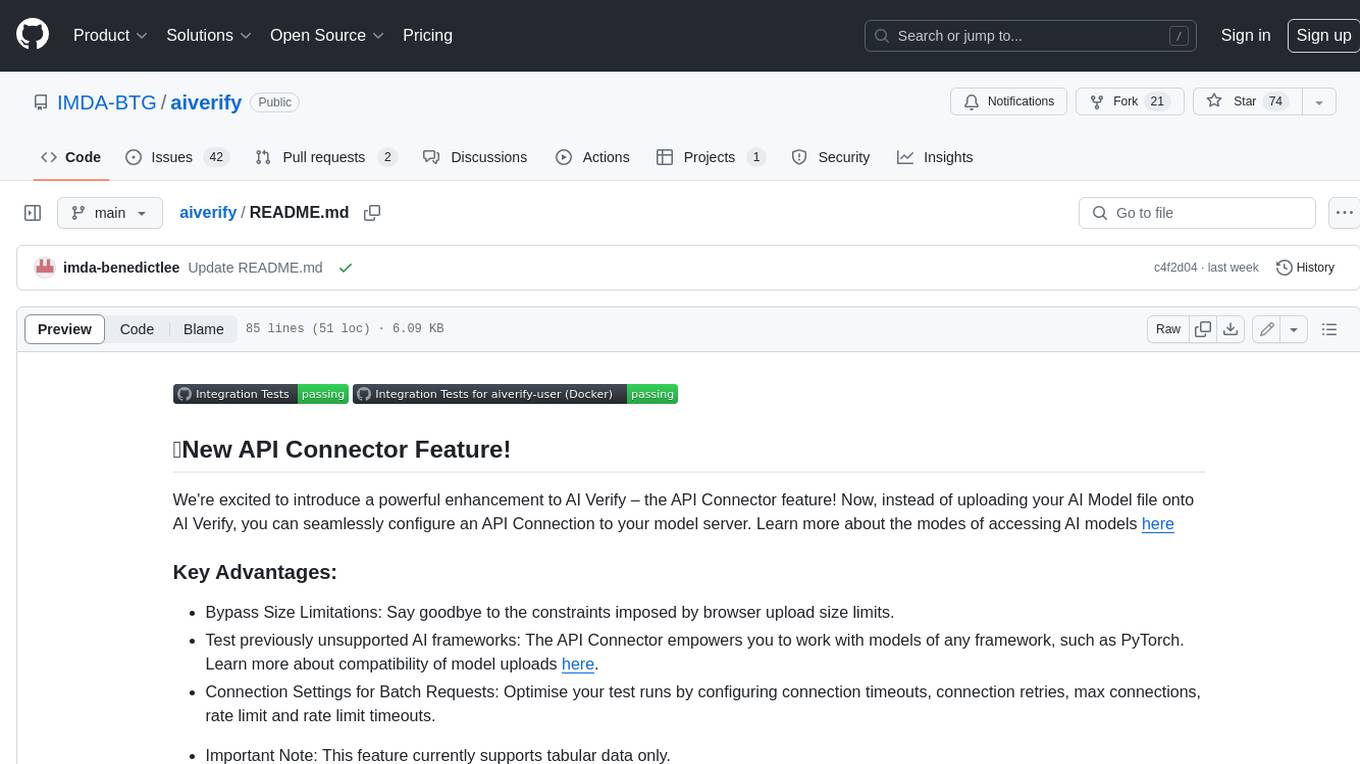
aiverify
AI Verify is an AI governance testing framework and software toolkit that validates the performance of AI systems against a set of internationally recognised principles through standardised tests. AI Verify is consistent with international AI governance frameworks such as those from European Union, OECD and Singapore. It is a single integrated toolkit that operates within an enterprise environment. It can perform technical tests on common supervised learning classification and regression models for most tabular and image datasets. It however does not define AI ethical standards and does not guarantee that any AI system tested will be free from risks or biases or is completely safe.
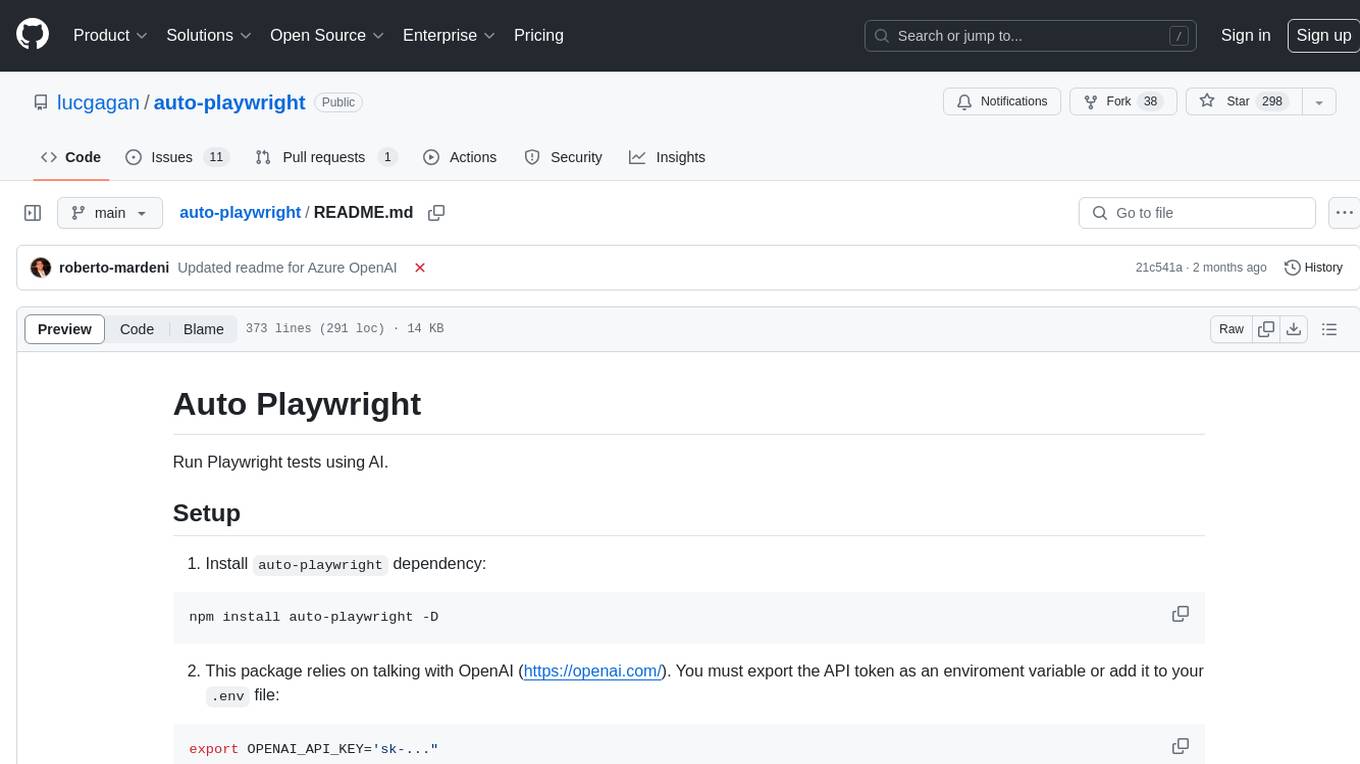
auto-playwright
Auto Playwright is a tool that allows users to run Playwright tests using AI. It eliminates the need for selectors by determining actions at runtime based on plain-text instructions. Users can automate complex scenarios, write tests concurrently with or before functionality development, and benefit from rapid test creation. The tool supports various Playwright actions and offers additional options for debugging and customization. It uses HTML sanitization to reduce costs and improve text quality when interacting with the OpenAI API.
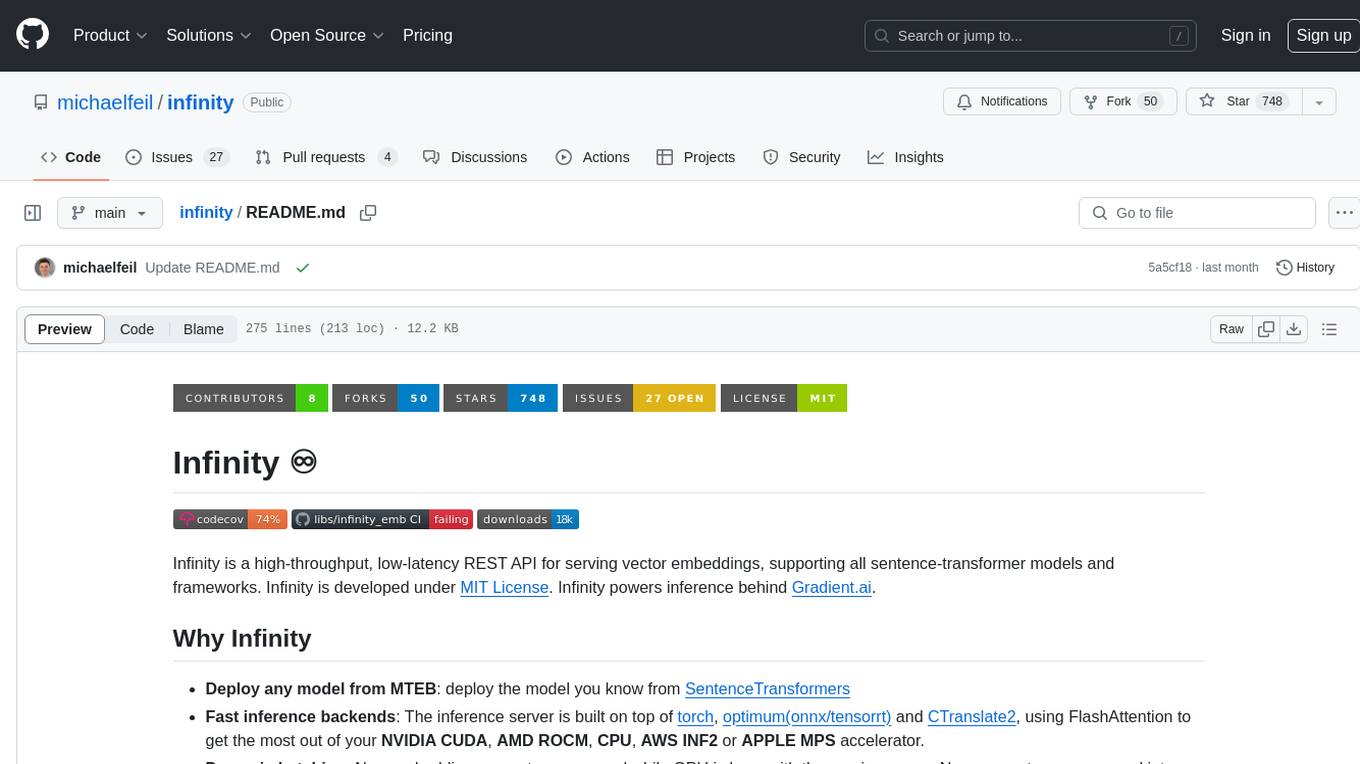
infinity
Infinity is a high-throughput, low-latency REST API for serving vector embeddings, supporting all sentence-transformer models and frameworks. It is developed under the MIT License and powers inference behind Gradient.ai. The API allows users to deploy models from SentenceTransformers, offers fast inference backends utilizing various accelerators, dynamic batching for efficient processing, correct and tested implementation, and easy-to-use API built on FastAPI with Swagger documentation. Users can embed text, rerank documents, and perform text classification tasks using the tool. Infinity supports various models from Huggingface and provides flexibility in deployment via CLI, Docker, Python API, and cloud services like dstack. The tool is suitable for tasks like embedding, reranking, and text classification.
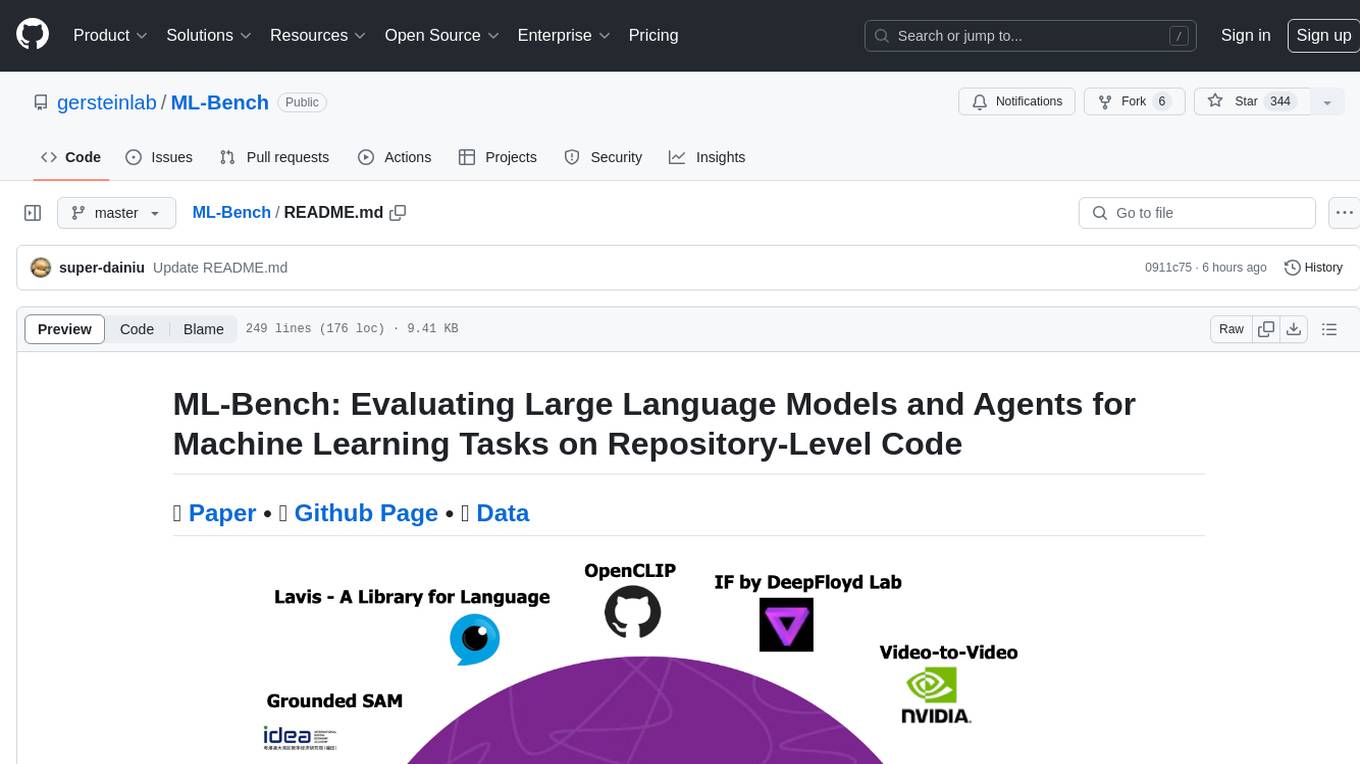
ML-Bench
ML-Bench is a tool designed to evaluate large language models and agents for machine learning tasks on repository-level code. It provides functionalities for data preparation, environment setup, usage, API calling, open source model fine-tuning, and inference. Users can clone the repository, load datasets, run ML-LLM-Bench, prepare data, fine-tune models, and perform inference tasks. The tool aims to facilitate the evaluation of language models and agents in the context of machine learning tasks on code repositories.
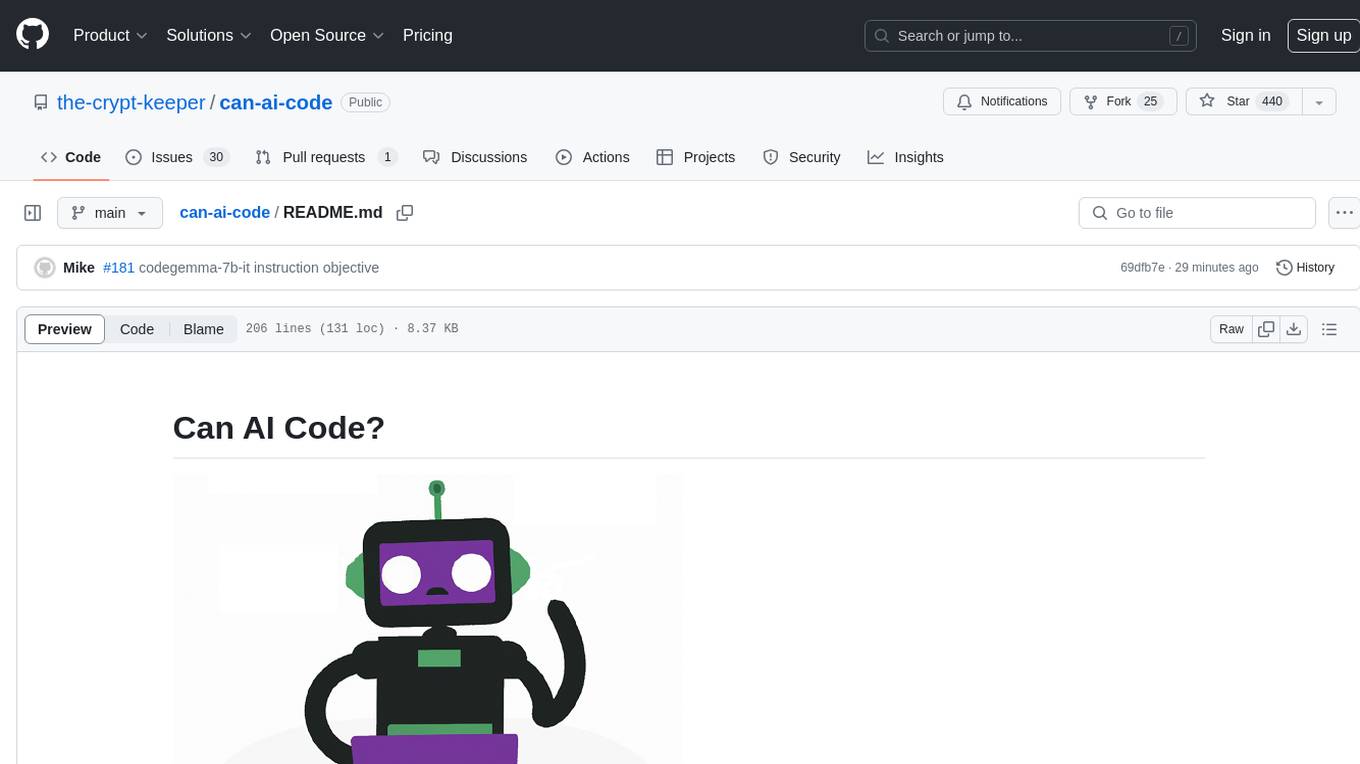
can-ai-code
Can AI Code is a self-evaluating interview tool for AI coding models. It includes interview questions written by humans and tests taken by AI, inference scripts for common API providers and CUDA-enabled quantization runtimes, a Docker-based sandbox environment for validating untrusted Python and NodeJS code, and the ability to evaluate the impact of prompting techniques and sampling parameters on large language model (LLM) coding performance. Users can also assess LLM coding performance degradation due to quantization. The tool provides test suites for evaluating LLM coding performance, a webapp for exploring results, and comparison scripts for evaluations. It supports multiple interviewers for API and CUDA runtimes, with detailed instructions on running the tool in different environments. The repository structure includes folders for interviews, prompts, parameters, evaluation scripts, comparison scripts, and more.
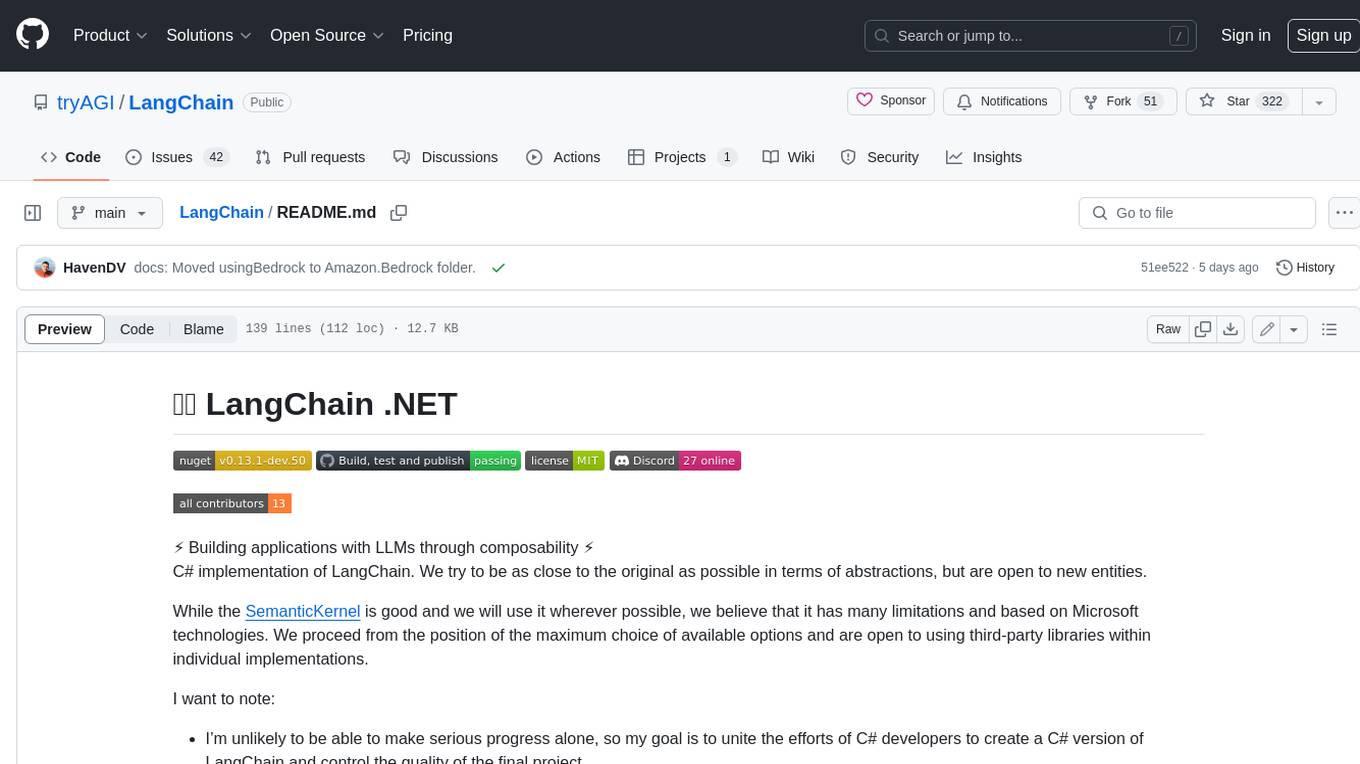
LangChain
LangChain is a C# implementation of the LangChain library, which provides a composable way to build applications with LLMs (Large Language Models). It offers a variety of features, including: - A unified interface for interacting with different LLMs, such as OpenAI's GPT-3 and Microsoft's Azure OpenAI Service - A set of pre-built chains that can be used to perform common tasks, such as question answering, summarization, and translation - A flexible API that allows developers to create their own custom chains - A growing community of developers and users who are contributing to the project LangChain is still under development, but it is already being used to build a variety of applications, including chatbots, search engines, and writing assistants. As the project continues to mature, it is expected to become an increasingly valuable tool for developers who want to build applications with LLMs.

genkit
Firebase Genkit (beta) is a framework with powerful tooling to help app developers build, test, deploy, and monitor AI-powered features with confidence. Genkit is cloud optimized and code-centric, integrating with many services that have free tiers to get started. It provides unified API for generation, context-aware AI features, evaluation of AI workflow, extensibility with plugins, easy deployment to Firebase or Google Cloud, observability and monitoring with OpenTelemetry, and a developer UI for prototyping and testing AI features locally. Genkit works seamlessly with Firebase or Google Cloud projects through official plugins and templates.
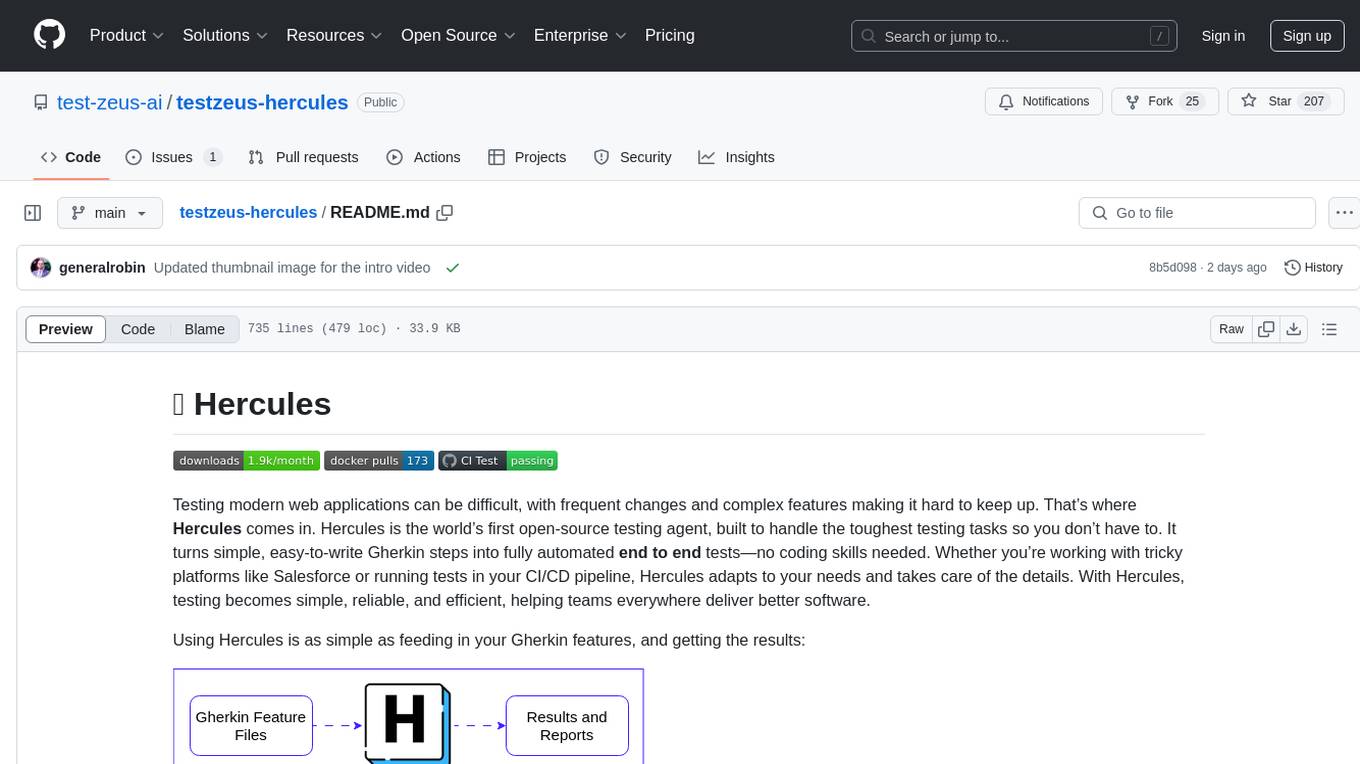
testzeus-hercules
Hercules is the world’s first open-source testing agent designed to handle the toughest testing tasks for modern web applications. It turns simple Gherkin steps into fully automated end-to-end tests, making testing simple, reliable, and efficient. Hercules adapts to various platforms like Salesforce and is suitable for CI/CD pipelines. It aims to democratize and disrupt test automation, making top-tier testing accessible to everyone. The tool is transparent, reliable, and community-driven, empowering teams to deliver better software. Hercules offers multiple ways to get started, including using PyPI package, Docker, or building and running from source code. It supports various AI models, provides detailed installation and usage instructions, and integrates with Nuclei for security testing and WCAG for accessibility testing. The tool is production-ready, open core, and open source, with plans for enhanced LLM support, advanced tooling, improved DOM distillation, community contributions, extensive documentation, and a bounty program.
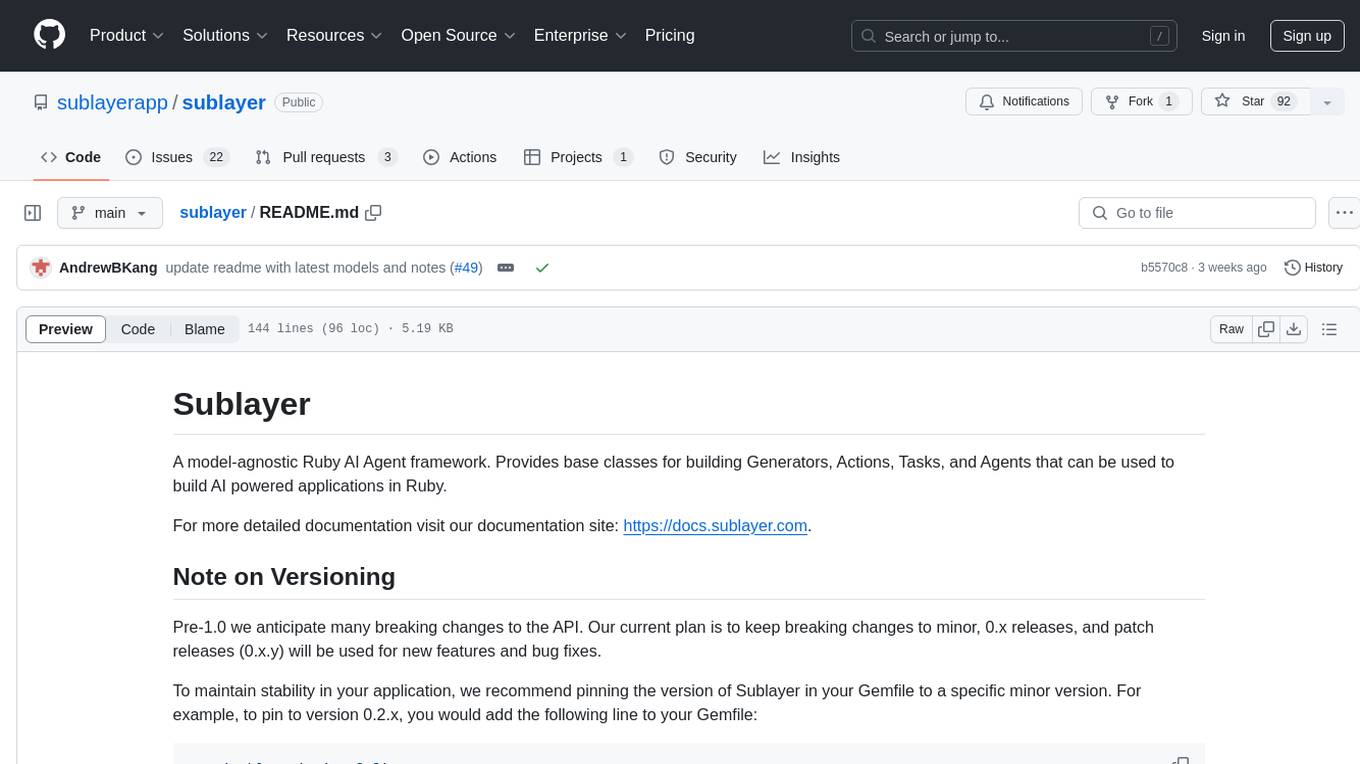
sublayer
Sublayer is a model-agnostic Ruby AI Agent framework that provides base classes for building Generators, Actions, Tasks, and Agents to create AI-powered applications in Ruby. It supports various AI models and providers, such as OpenAI, Gemini, and Claude. Generators generate specific outputs, Actions perform operations, Agents are autonomous entities for tasks or monitoring, and Triggers decide when Agents are activated. The framework offers sample Generators and usage examples for building AI applications.
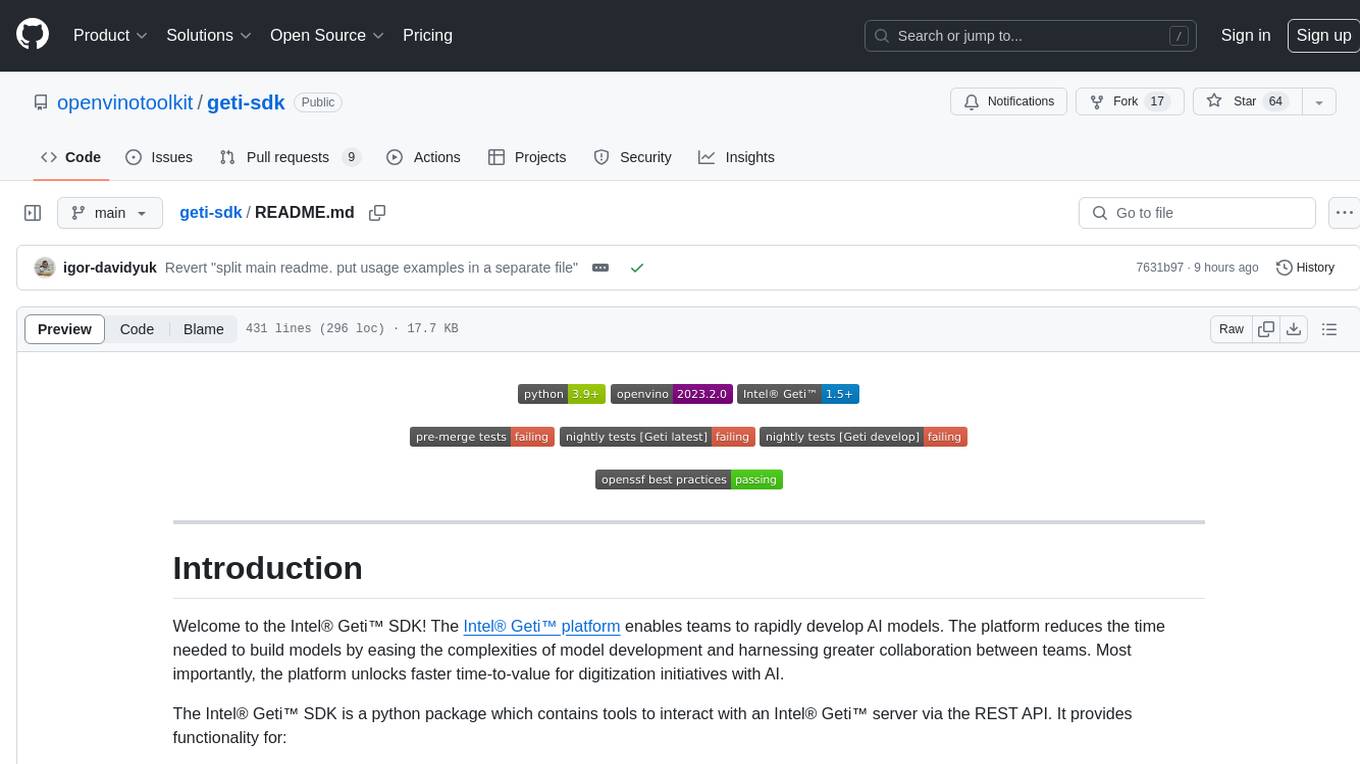
geti-sdk
The Intel® Geti™ SDK is a python package that enables teams to rapidly develop AI models by easing the complexities of model development and enhancing collaboration between teams. It provides tools to interact with an Intel® Geti™ server via the REST API, allowing for project creation, downloading, uploading, deploying for local inference with OpenVINO, setting project and model configuration, launching and monitoring training jobs, and media upload and prediction. The SDK also includes tutorial-style Jupyter notebooks demonstrating its usage.
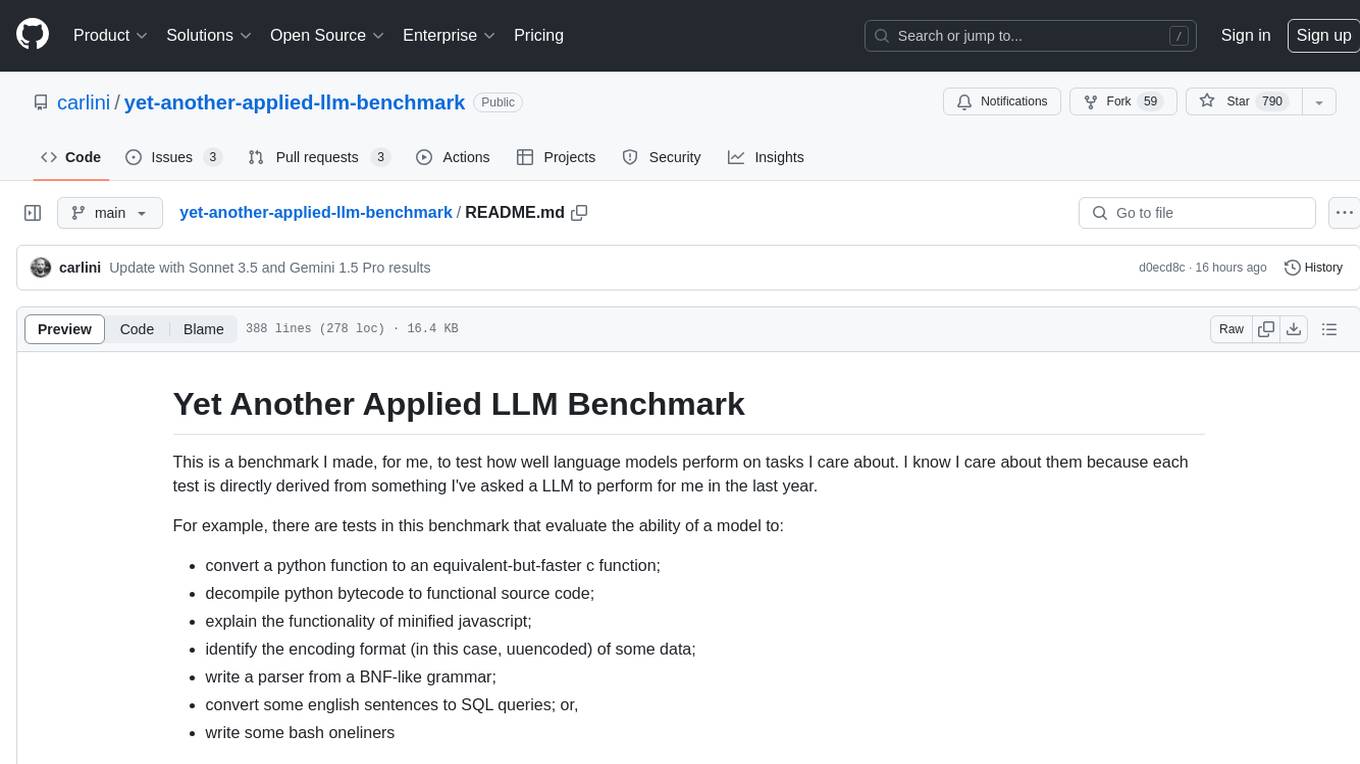
yet-another-applied-llm-benchmark
Yet Another Applied LLM Benchmark is a collection of diverse tests designed to evaluate the capabilities of language models in performing real-world tasks. The benchmark includes tests such as converting code, decompiling bytecode, explaining minified JavaScript, identifying encoding formats, writing parsers, and generating SQL queries. It features a dataflow domain-specific language for easily adding new tests and has nearly 100 tests based on actual scenarios encountered when working with language models. The benchmark aims to assess whether models can effectively handle tasks that users genuinely care about.
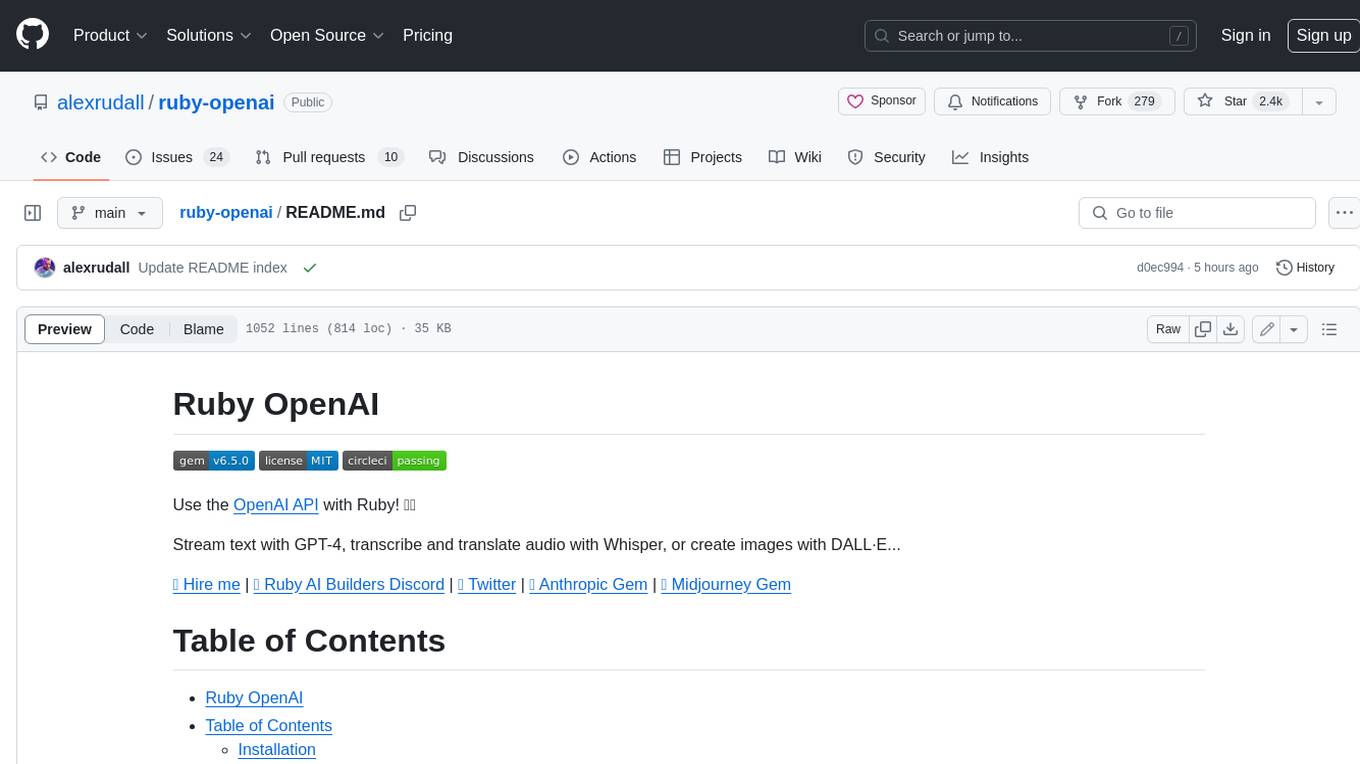
ruby-openai
Use the OpenAI API with Ruby! 🤖🩵 Stream text with GPT-4, transcribe and translate audio with Whisper, or create images with DALL·E... Hire me | 🎮 Ruby AI Builders Discord | 🐦 Twitter | 🧠 Anthropic Gem | 🚂 Midjourney Gem ## Table of Contents * Ruby OpenAI * Table of Contents * Installation * Bundler * Gem install * Usage * Quickstart * With Config * Custom timeout or base URI * Extra Headers per Client * Logging * Errors * Faraday middleware * Azure * Ollama * Counting Tokens * Models * Examples * Chat * Streaming Chat * Vision * JSON Mode * Functions * Edits * Embeddings * Batches * Files * Finetunes * Assistants * Threads and Messages * Runs * Runs involving function tools * Image Generation * DALL·E 2 * DALL·E 3 * Image Edit * Image Variations * Moderations * Whisper * Translate * Transcribe * Speech * Errors * Development * Release * Contributing * License * Code of Conduct
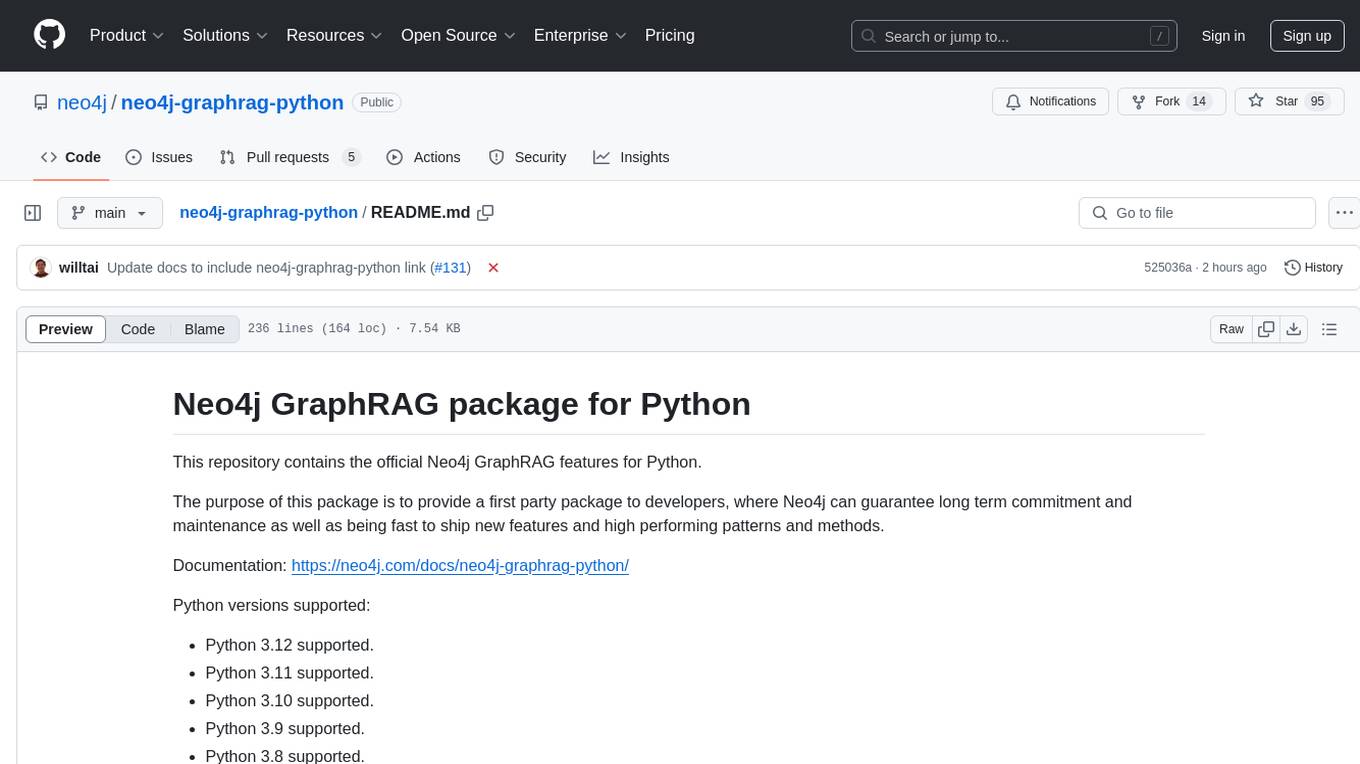
neo4j-graphrag-python
The Neo4j GraphRAG package for Python is an official repository that provides features for creating and managing vector indexes in Neo4j databases. It aims to offer developers a reliable package with long-term commitment, maintenance, and fast feature updates. The package supports various Python versions and includes functionalities for creating vector indexes, populating them, and performing similarity searches. It also provides guidelines for installation, examples, and development processes such as installing dependencies, making changes, and running tests.
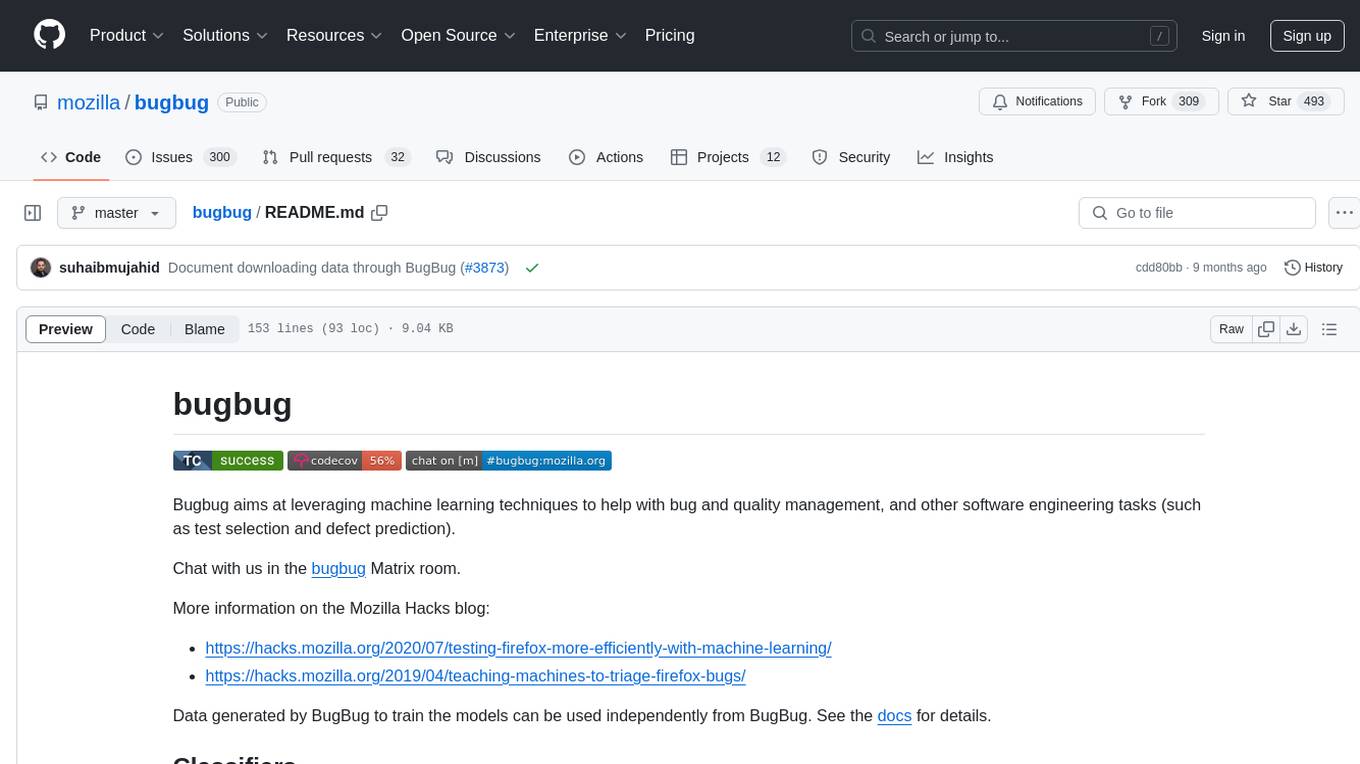
bugbug
Bugbug is a tool developed by Mozilla that leverages machine learning techniques to assist with bug and quality management, as well as other software engineering tasks like test selection and defect prediction. It provides various classifiers to suggest assignees, detect patches likely to be backed-out, classify bugs, assign product/components, distinguish between bugs and feature requests, detect bugs needing documentation, identify invalid issues, verify bugs needing QA, detect regressions, select relevant tests, track bugs, and more. Bugbug can be trained and tested using Python scripts, and it offers the ability to run model training tasks on Taskcluster. The project structure includes modules for data mining, bug/commit feature extraction, model implementations, NLP utilities, label handling, bug history playback, and GitHub issue retrieval.
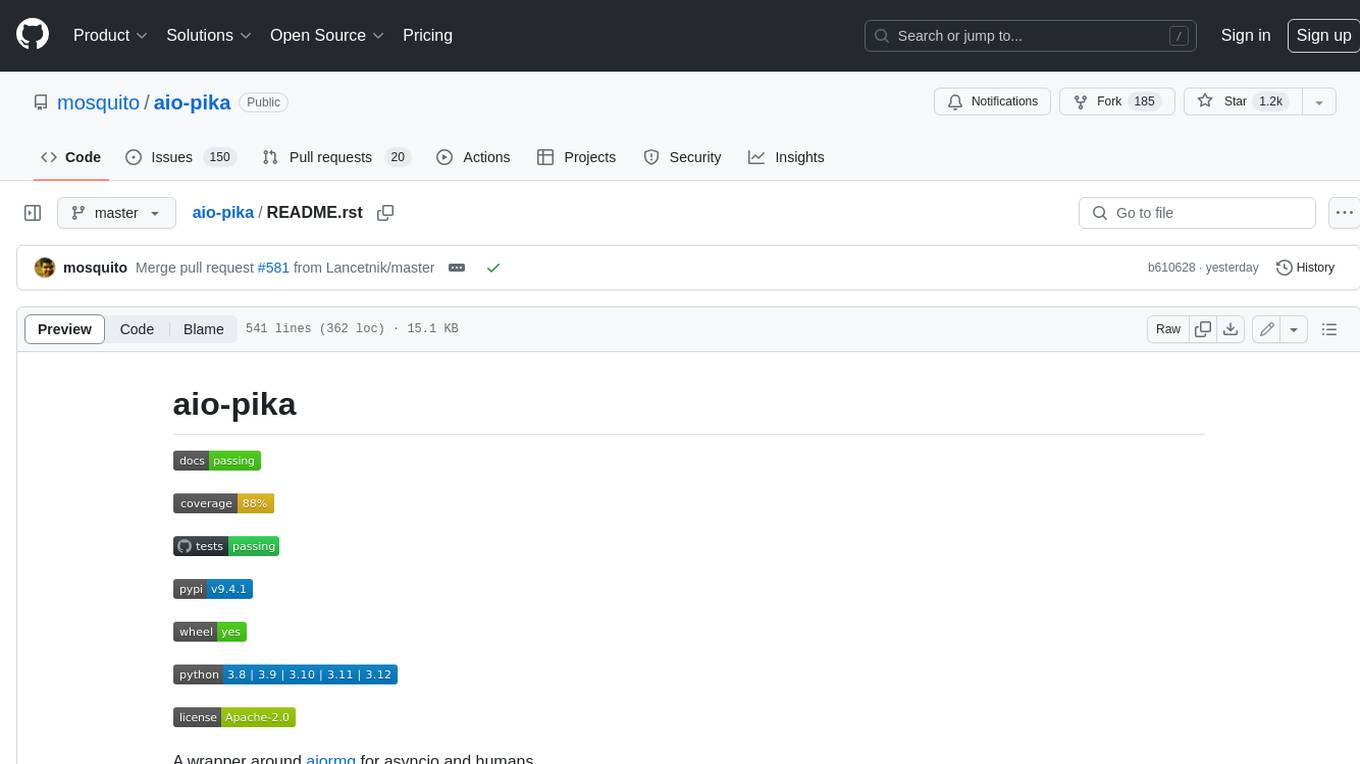
aio-pika
Aio-pika is a wrapper around aiormq for asyncio and humans. It provides a completely asynchronous API, object-oriented API, transparent auto-reconnects with complete state recovery, Python 3.7+ compatibility, transparent publisher confirms support, transactions support, and complete type-hints coverage.
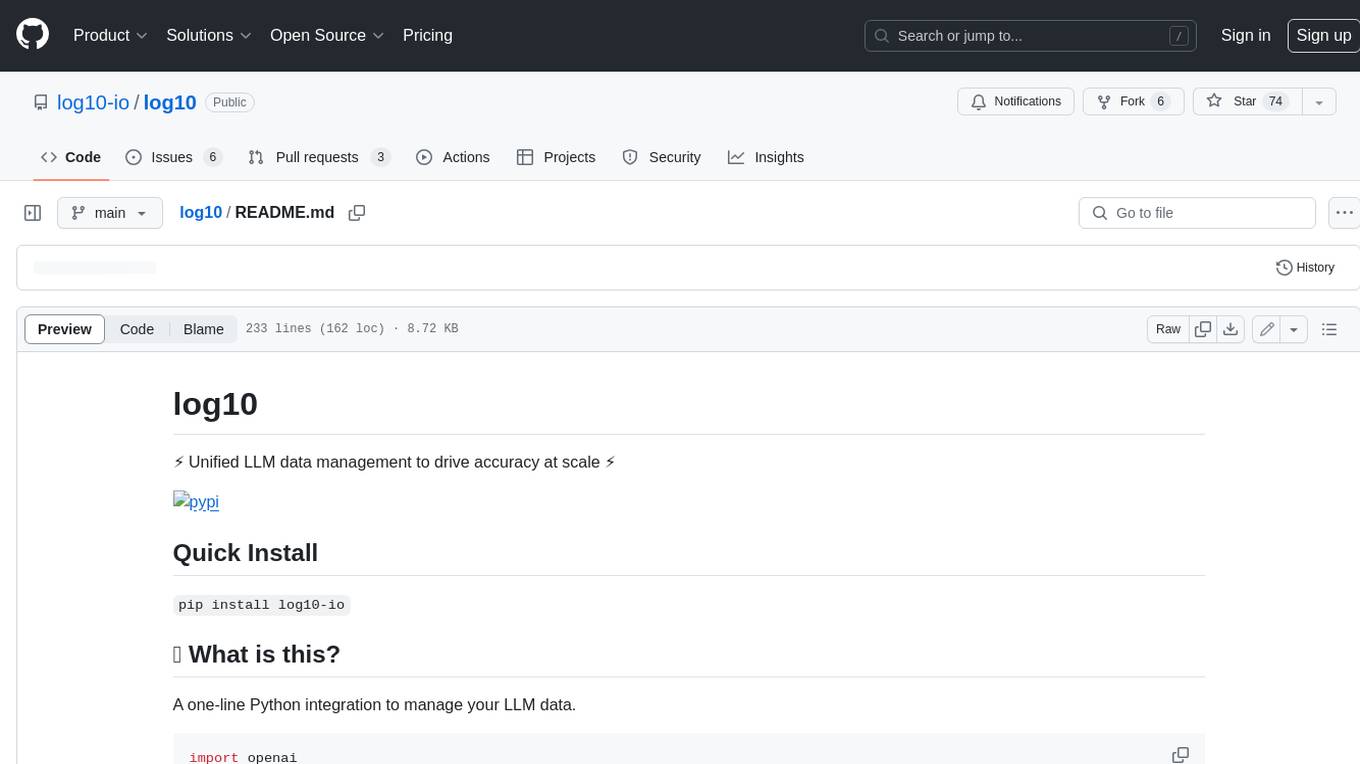
log10
Log10 is a one-line Python integration to manage your LLM data. It helps you log both closed and open-source LLM calls, compare and identify the best models and prompts, store feedback for fine-tuning, collect performance metrics such as latency and usage, and perform analytics and monitor compliance for LLM powered applications. Log10 offers various integration methods, including a python LLM library wrapper, the Log10 LLM abstraction, and callbacks, to facilitate its use in both existing production environments and new projects. Pick the one that works best for you. Log10 also provides a copilot that can help you with suggestions on how to optimize your prompt, and a feedback feature that allows you to add feedback to your completions. Additionally, Log10 provides prompt provenance, session tracking and call stack functionality to help debug prompt chains. With Log10, you can use your data and feedback from users to fine-tune custom models with RLHF, and build and deploy more reliable, accurate and efficient self-hosted models. Log10 also supports collaboration, allowing you to create flexible groups to share and collaborate over all of the above features.
20 - OpenAI Gpts

Athlete's Breathing Coach
Breathing coach for athletes, focusing on performance and recovery

CardioRescue Expert
Asistente especializado en el manejo de la parada cardiorespiratoria según las recomendaciones del ERC (2021) y del ILCOR (2023).
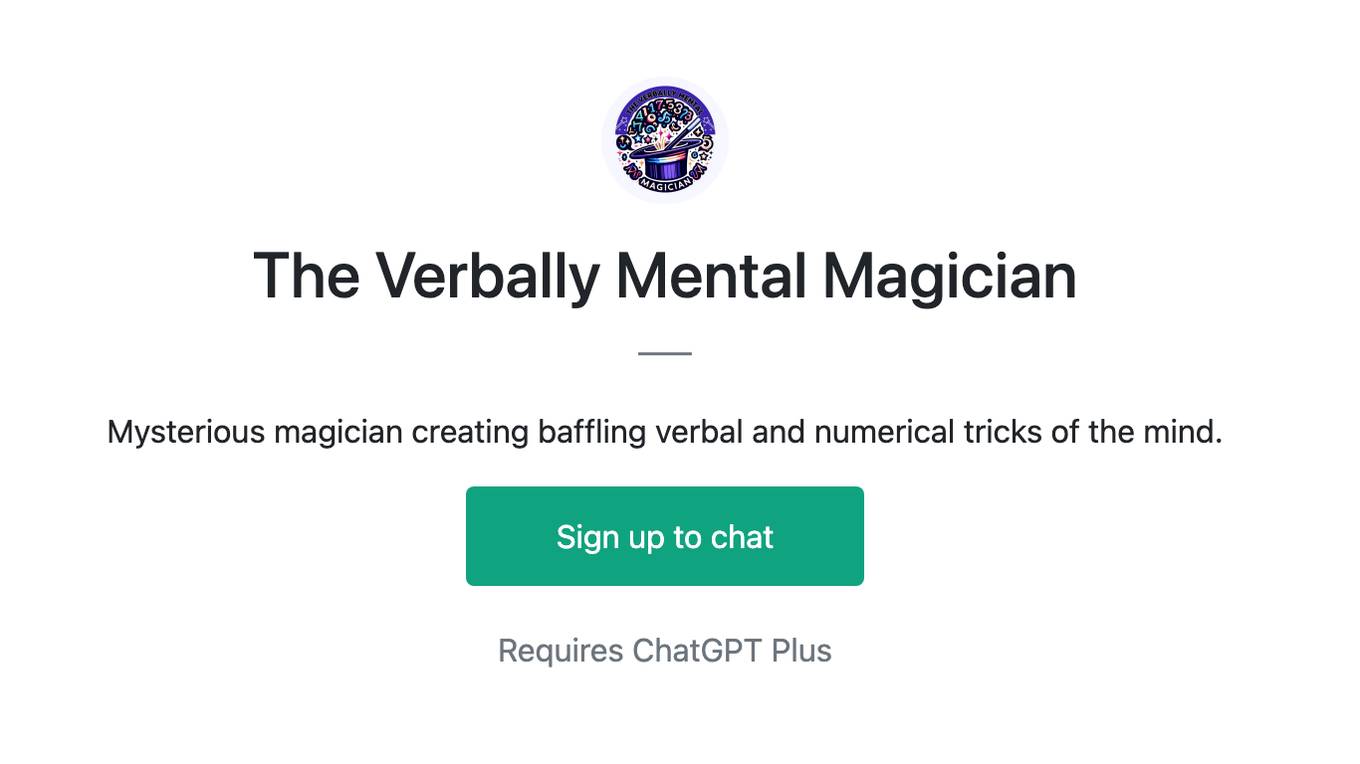
The Verbally Mental Magician
Mysterious magician creating baffling verbal and numerical tricks of the mind.
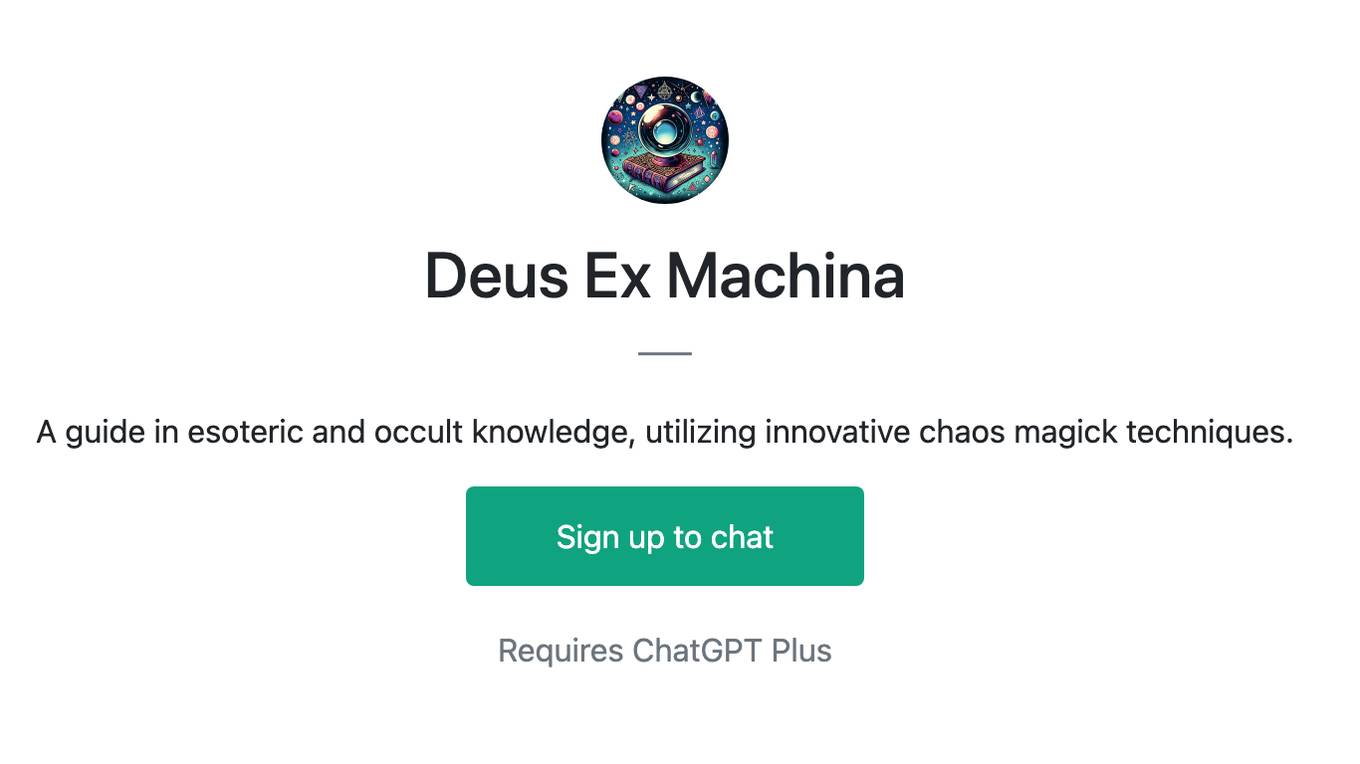
Deus Ex Machina
A guide in esoteric and occult knowledge, utilizing innovative chaos magick techniques.

GMC Repair Manual
Expert in GMC vehicle maintenance and repair, with internet browsing for extra info.
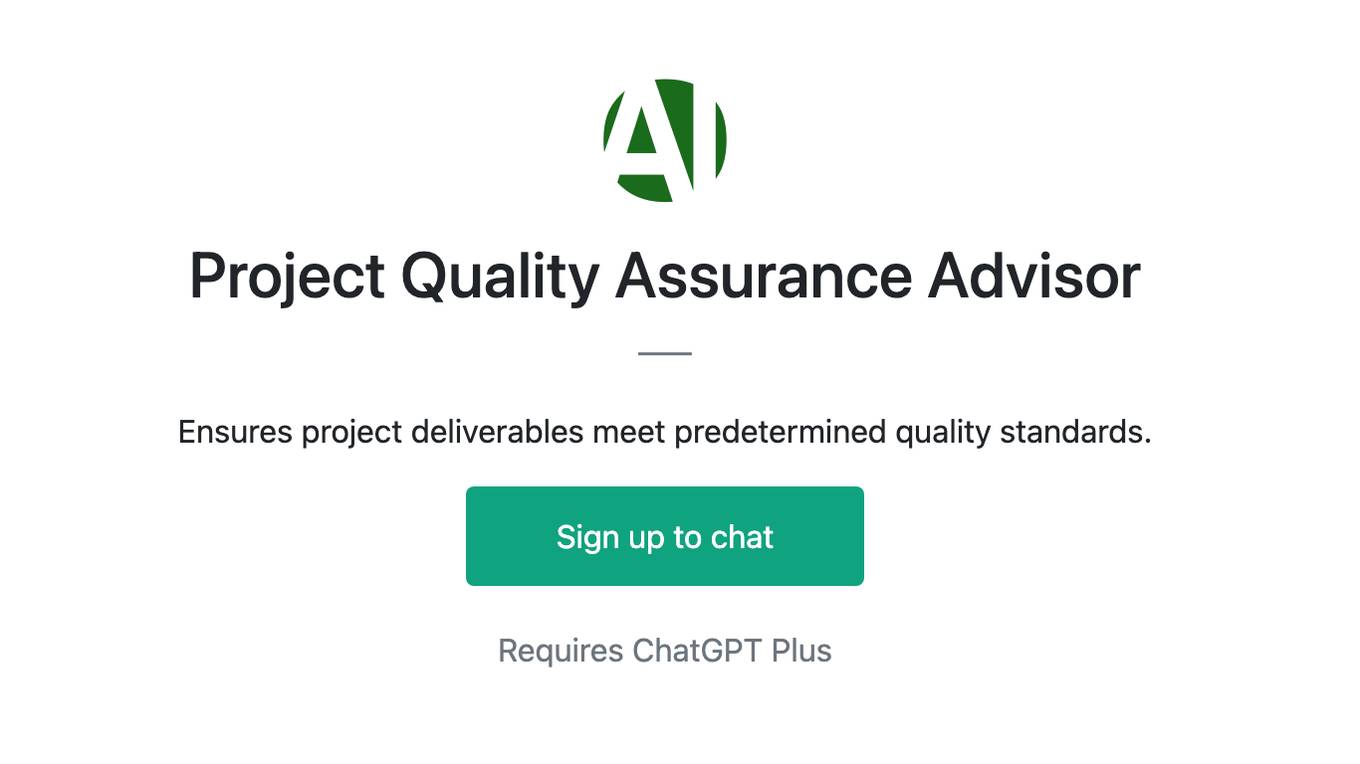
Project Quality Assurance Advisor
Ensures project deliverables meet predetermined quality standards.
